#king goujian of yue
Explore tagged Tumblr posts
Text
My Vow To My Liege
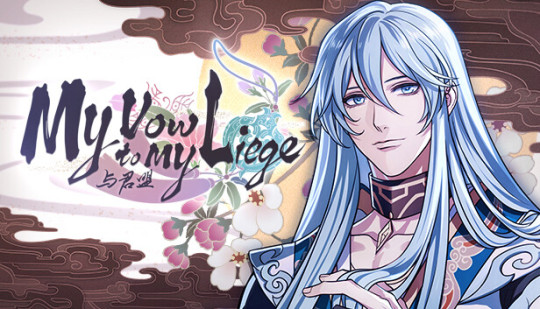
During the Spring and Autumn Period (approximately between 771 - 476BC), wars were endless as the Liege of a certain nation struggled for hegemony. The Kingdom of Ng emerged victorious over their old enemy, the Kingdom of Yue. However, the victory came at a great cost as King HéLǘ of Ng sustained fatal injuries. He passed the throne to the new king, a girl named 'FuChai'.
She is forced to live a lie to fulfil the secret and long-standing wish of her ancestors, breaking their sacred vow with the Dragon God. A reprieve suddenly appears amid countless bloody battles to seal the Dragon God. Amid the chaos, who will sacrifice their life loyally and who will plot a scheme of betrayal? Will they choose the man over the country? Love over hate? Who will they ultimately end up with?
CHARACTERS
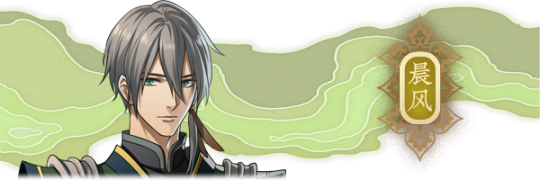
Chen Feng was orphaned on a battlefield and taken in by HéLǘ to be FuChai's playmate. He studied under Mr Sun Wu to become FuChai's most loyal and dependable bodyguard. He is a calm and unapproachable man who speaks very little.
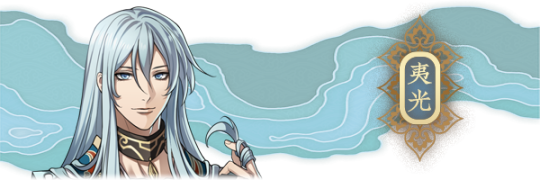
Shi YiGuang is a citizen of Ng and the upcoming leader of the Shi Clan, which is the most magically powerful clan in the Kingdom of Ng and Yue. He is also nicknamed XiShi. As a child, he played with FuChai. He escaped secretly to ZhuLuo Village in the Kingdom of Yue to avoid being sacrificed at the Sword Pond. XiShi has exceptional medical skills and is known for his gentle and kind nature.
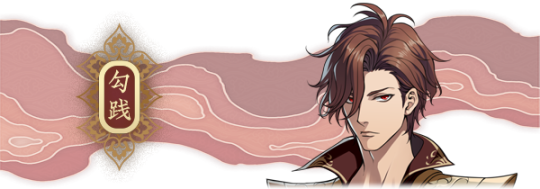
GouJian, the king of Yue, surrendered himself to Ng after losing the war and became a slave guarding HéLǘ's mausoleum. Despite his pride and arrogance, he suffered terrible humiliation as a slave. Despite his pride and arrogance, he suffered terrible humiliation as a slave, which only fueled his determination to take revenge on Ng by exterminating the whole country. However, he inadvertently becomes friends with FuChai.
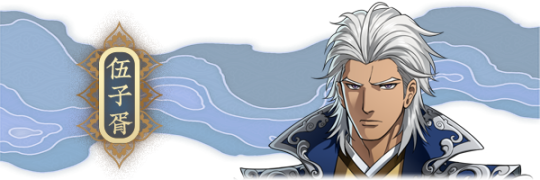
Wu ZiXu hailed from the Kingdom of Chu. As a young boy, the King of Chu executed his family and clansmen, causing his hair to turn white overnight. He was brought up by HéLǘ and his sole purpose in life is to assist FuChai in breaking the sacred vow with the Dragon God. Wu ZiXu is a highly cautious yet dependable individual.
NOTE: As the developer has only allowed streaming/walkthrough for the prologue and first 10 chapters, I will respect their decision. I will not post any CGs, and the following is the walkthrough/story for the prologue and first 10 chapters.
youtube
#my vow to my liege#otome#visual novel#FuChai#King of Ng#XiShi#Kingdom of Yue#Dragon God#Shi YiGuang#GouJian#Wu ZiXu#Chen Feng#love#dating#romance#historical work#Youtube
3 notes
·
View notes
Text
[Hanfu · 漢服]Chinese Late Warring States period(475–221 BC) Traditional Clothing Hanfu Based On Based On Chu (state)Historical Artifacts
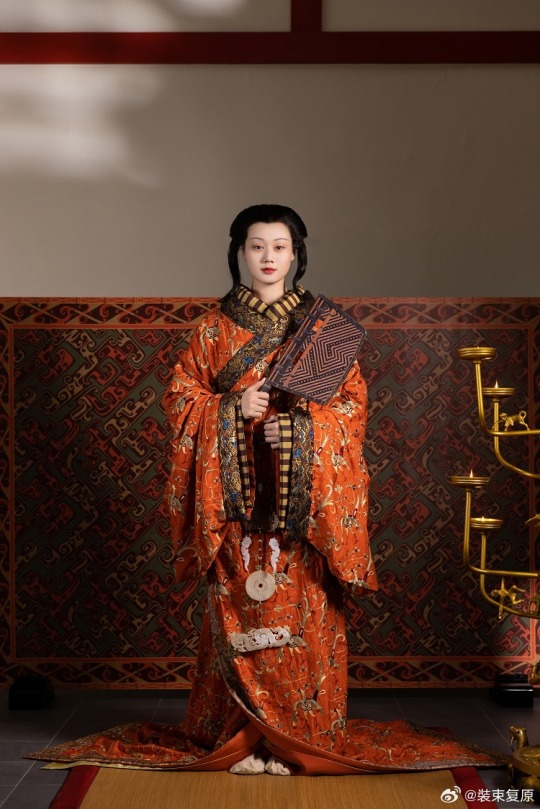
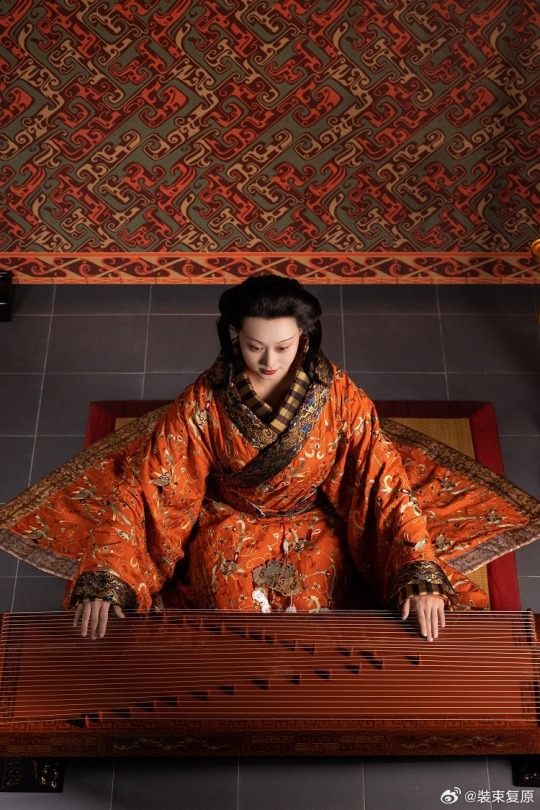
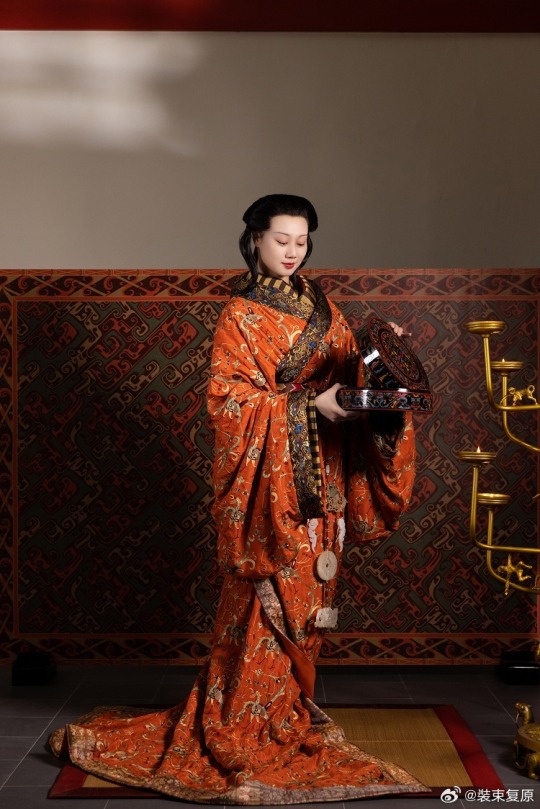
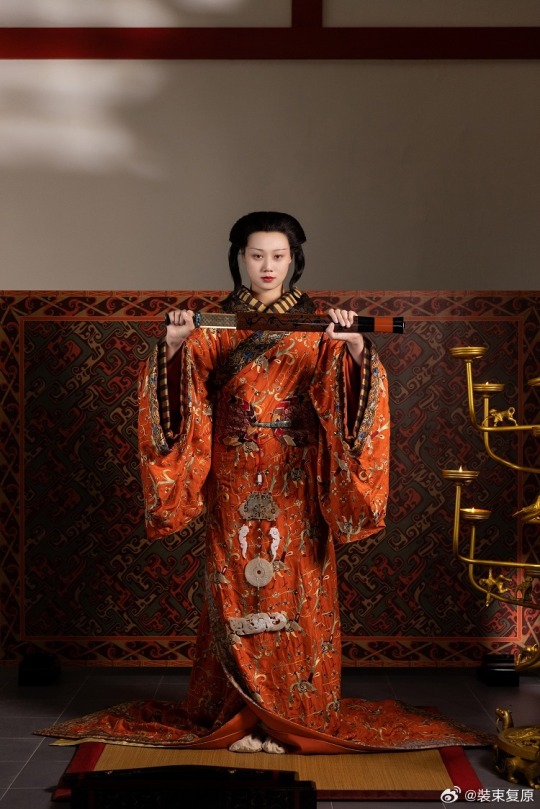
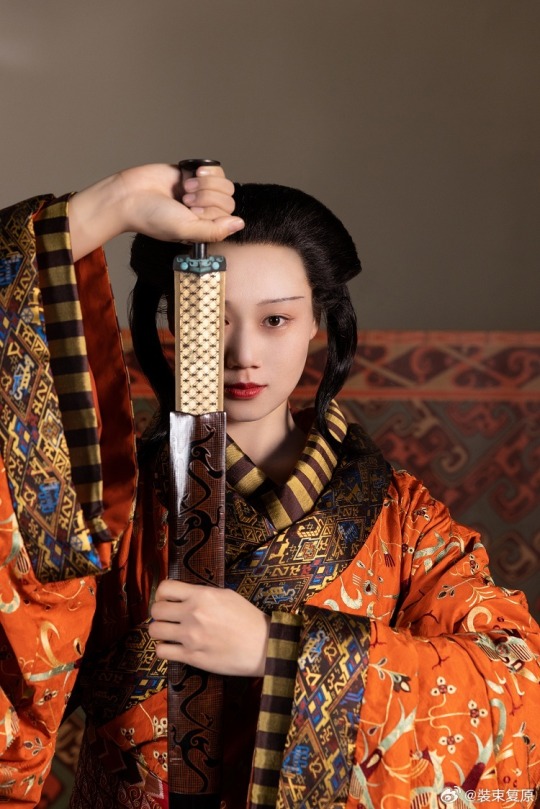
【Historical Artifact Reference】:
Late Warring States period(475–221 BC):Two conjoined jade dancers unearthed from Jincun, Luoyang,collected by Freer Museum of Art
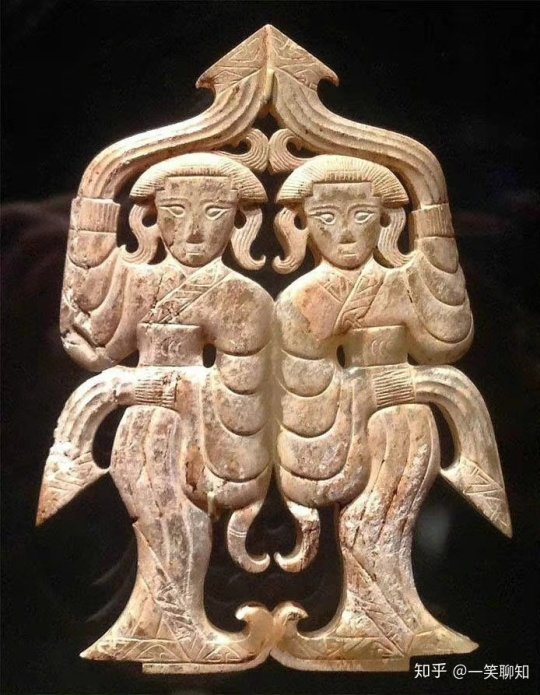
A similar jade dancer was also unearthed from the tomb of Haihunhou, the richest royal family member in the Han Dynasty, and was one of his treasures.
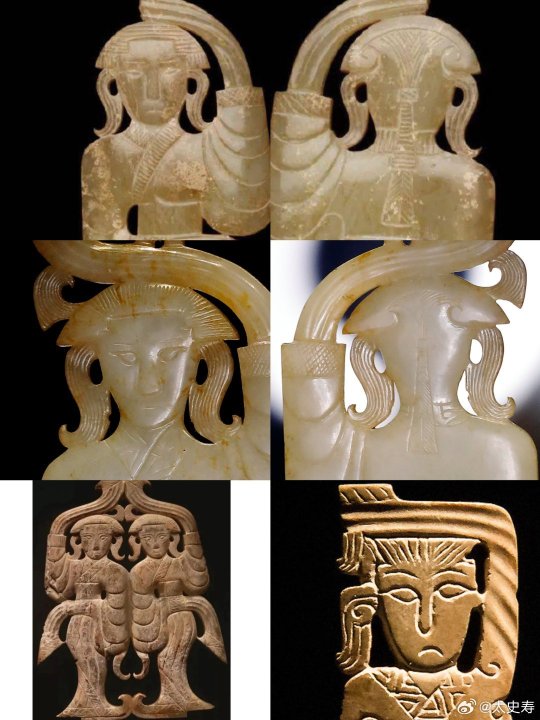
Warring States period, Eastern Zhou dynasty, 475-221 BCE,jade dancer by Freer Gallery of Art Collection.
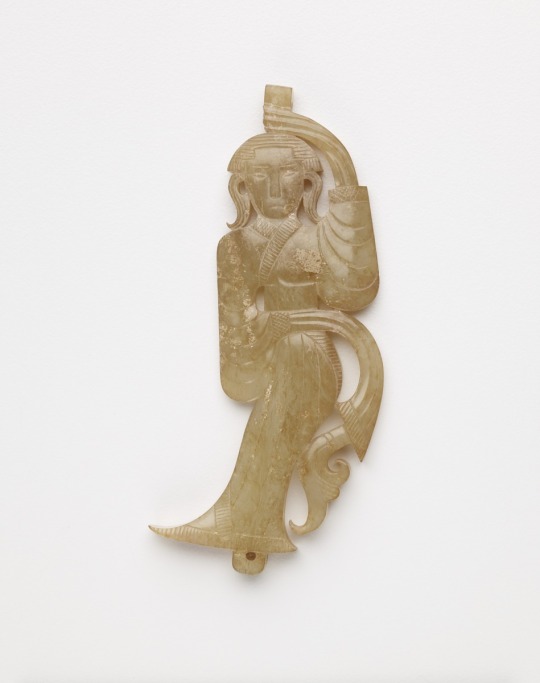
Warring States period(475–221 BC)·Silver Head Figurine Bronze Lamp.Unearthed from the Wangcuo Tomb in Zhongshan state during the Warring States Period and collected by the Hebei Provincial Institute of Cultural Relics and Archaeology
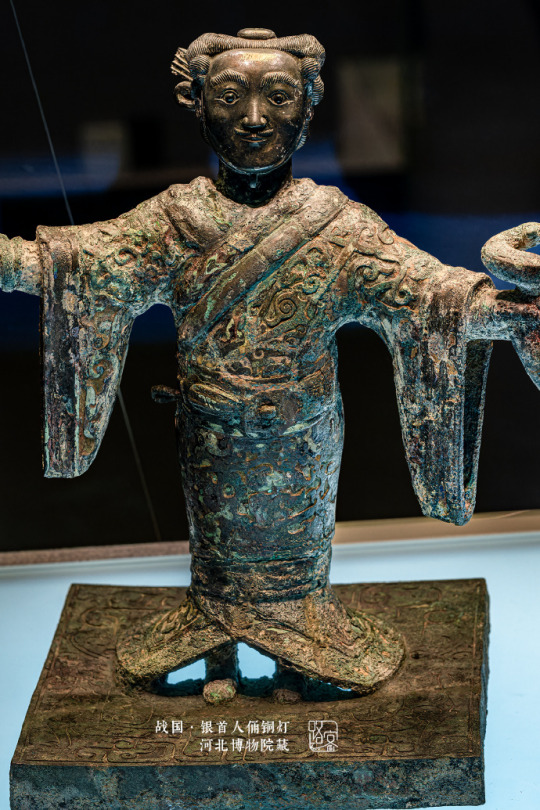
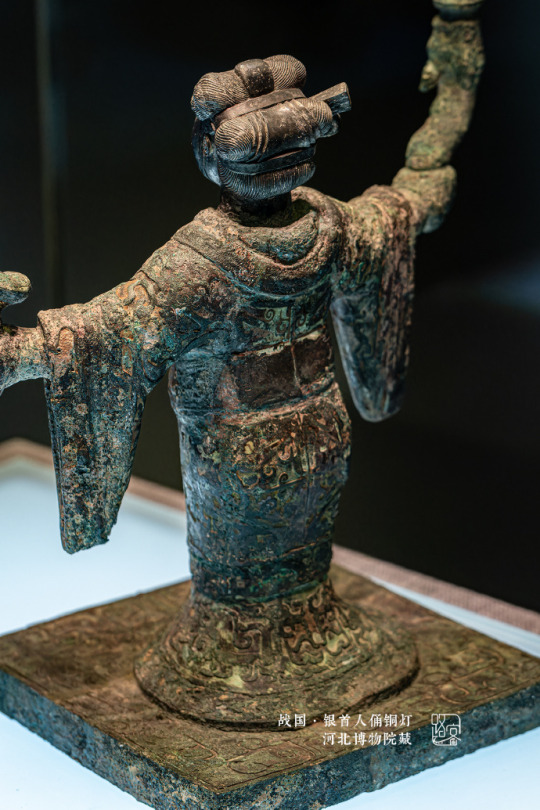
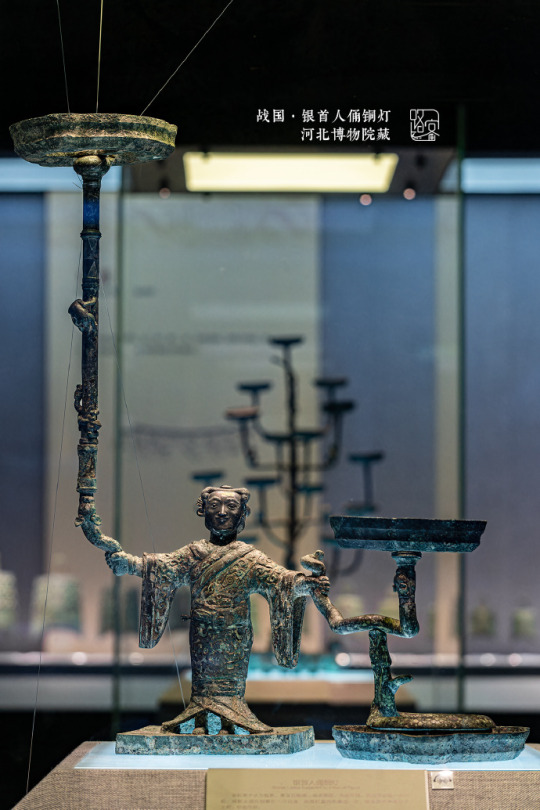
The figurine of a man dressed as a woman holds a snake in his hand, and 3 snakes correspond to 3 lamps.
Sword of Goujian/越王勾践剑:
The Sword of Goujian (Chinese: 越王勾践剑; pinyin: Yuèwáng Gōujiàn jiàn) is a tin bronze sword, renowned for its unusual sharpness, intricate design and resistance to tarnish rarely seen in artifacts of similar age. The sword is generally attributed to Goujian, one of the last kings of Yue during the Spring and Autumn period.
In 1965, the sword was found in an ancient tomb in Hubei. It is currently in the possession of the Hubei Provincial Museum.
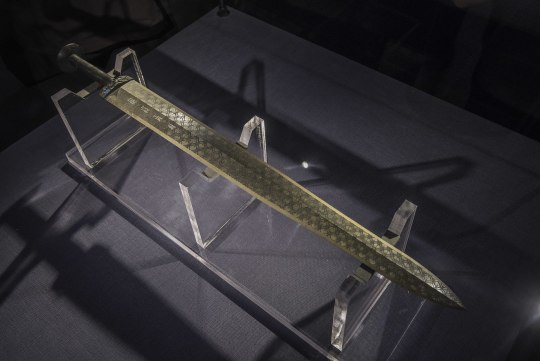
【Histoty Note】Late Warring States Period·Noble Women Fashion
The attire of noblewomen in the late Warring States period, as reconstructed in this collection, is based on a comprehensive examination of garments and textiles unearthed from the Chu Tomb No. 1 at Mashan, Jiangling, as well as other artifacts from the same period.
During the late Warring States period, both noble men and women favored wearing robes that were connected from top to bottom. These garments were predominantly made of gauze, silk, brocade, and satin, with silk edging. From the Chu Tomb No. 1 at Mashan, there were discoveries of robes entirely embroidered or embroidered fragments. The embroidery technique employed was known as "locked stitches," which gave the patterns a three-dimensional, lively appearance, rich in decoration.
The two reconstructed robes in this collection consist of an inner robe made of plain silk with striped silk edging, and an outer robe made of brocade, embroidered with phoenixes and floral patterns, with embroidered satin edging. Following the structural design of clothing found in the Mashan Chu Tomb, rectangular fabric pieces were inserted at the junction of the main body, sleeves, and lower garment of the robe. Additionally, an overlap was made at the front of the main body and the lower garment to enlarge the internal space for better wrapping around the body curves. Furthermore, the waistline of the lower garment was not horizontal but inclined upward at an angle, allowing the lower hem to naturally overlap, forming an "enter" shape, facilitating movement.
The layered edging of the collars and sleeves of both inner and outer robes creates a sense of rhythm, with the two types of brocade patterns complementing each other, resulting in a harmonious effect. Apart from the robes, a wide brocade belt was worn around the waist, fastened with jade buckle hooks, and adorned with jade pendants, presenting an elegant and noble figure.
The reconstructed hairstyle draws inspiration from artifacts such as the jade dancer from the late Warring States period unearthed at the Marquis of Haihun Tomb in Nanchang, and the jade dancer from the Warring States period unearthed at Jin Village in Luoyang. It features a fan-shaped voluminous hairdo on the crown, with curled hair falling on both sides, and braided hair gathered at the back. The Book of Songs, "Xiao Ya: Duren Shi," vividly depicts the flowing curls of noblewomen during that period. Their images of curly-haired figures in long robes were also depicted in jade artifacts and other relics, becoming emblematic artistic representations.
The maturity and richness of clothing art in the late Warring States period were unparalleled in contemporary world civilizations, far beyond imagination. It witnessed the transition of Chinese civilization into the Middle Ages. The creatively styled garments and intricate fabric patterns from the Warring States period carry the unique essence, mysterious imagination, and ultimate romanticism of that era, serving as an endless source of artistic inspiration.
--------
Recreation Work by : @裝束复原
Weibo 🔗:https://weibo.com/1656910125/O6cUMBa1j
--------
#chinese hanfu#Late Warring States Period#Warring States period(475–221 BC)#hanfu#hanfu accessories#chinese traditional clothing#hanfu_challenge#chinese#china#historical#historical fashion#chinese history#china history#漢服#汉服#中華風#裝束复原
284 notes
·
View notes
Text
It was only within the four walls of her bedroom that all that strength and masculinity was for her personal use.
me: huh that sounds really familiar i wonder what Past Me was thinking about when i wrote it...
me: ah, got it. sword of goujian engraving.

"King of Yue" (Chinese: 越王; pinyin: Yuèwáng) and "made this sword for [his] personal use" (Chinese: 自作用劍; pinyin: Zì zuòyòng jiàn).
9 notes
·
View notes
Text

~ "The Sword of Goujian, over 2,000 years old, was unearthed in 1965 near Jiangling, China, astonishing archaeologists with its pristine condition. Despite centuries in a damp tomb, the blade was completely rust-free and remained razor-sharp. Believed to have belonged to King Goujian of Yue, this remarkable weapon features intricate inscriptions and masterful craftsmanship that continue to puzzle experts, cementing its place as one of the most enigmatic relics of ancient China." ~
2 notes
·
View notes
Text
忘川风华录 Cheat Sheet - PRE-QIN
Character list for the music project/game Wang Chuan Feng Hua Lu
Created solely for my own convenience
All images etc taken from the game's official website
Info taken from Wikipedia
Mao-mao not included, sowwy
姜太公 | Jiang Taigong | Khương Thái Công
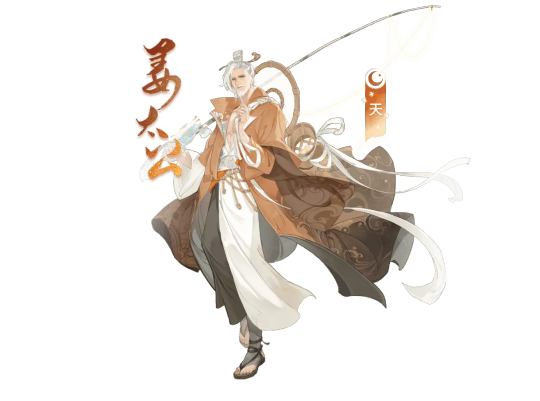
1128 BC - 1015 BC
Also known as Jiang Ziya / Taigong Wang / Lǚ Wang
General, strategist to King Wu of Zhou, helped establish the Zhou Dynasty
Song: Gui Diao Yin
Also appears in: Kuang Gu Hui Xiang
In-game rarity: 天
屈原 | Qu Yuan | Khuất Nguyên
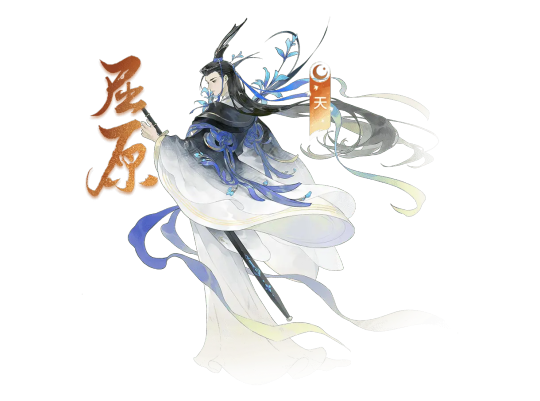
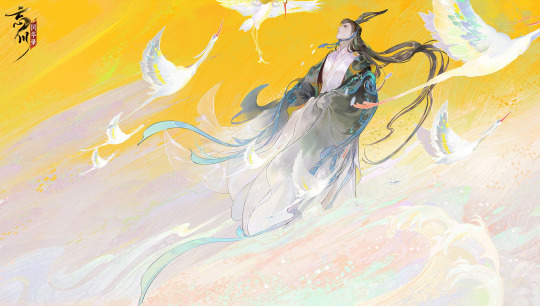
c. 340 BC – c. 278 BC
Poet, author of Li Sao, one of the first verse writers in ancient China
Theme song: N/A
Also appears in: Kuang Gu Hui Xiang
In-game rarity: 天
韩非 | Han Fei | Hàn Phi
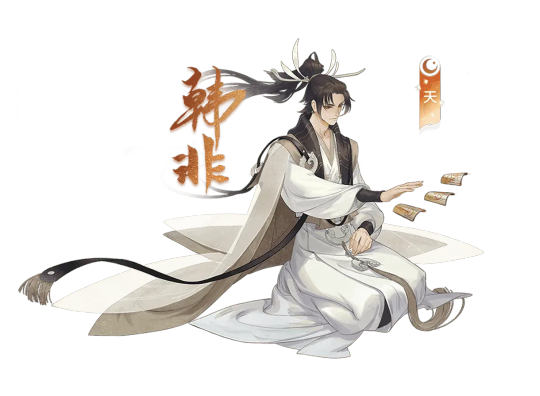
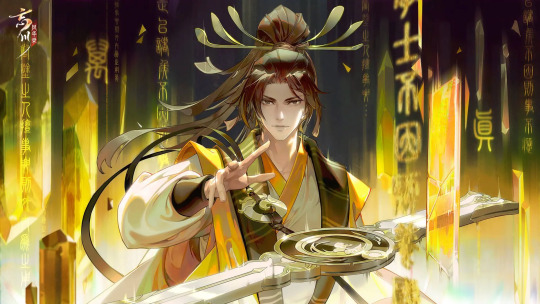
c. 280 BC – c. 233 BC
Philosopher of the Legalist school, author of Han Feizi
Song: Shi Fei
Also appears in: Kuang Gu Hui Xiang
In-game rarity: 天
西施 | Xi Shi | Tây Thi
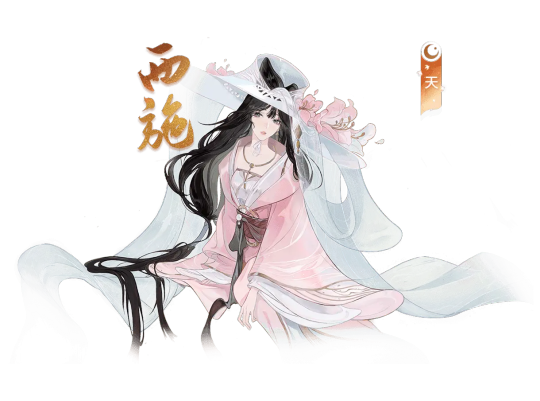
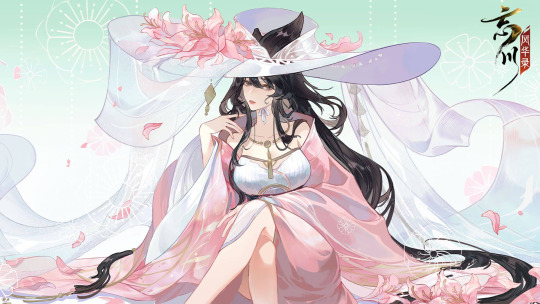
One of ancient China's Four Beauties
Given to Fuchai which allegedly led to the fall of the State of Wu
Song: Qing Guo
In-game rarity: 天
范蠡 | Fan Li | Phạm Lãi
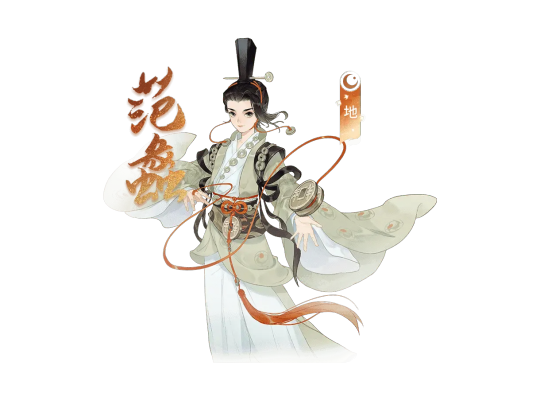
Strategist of Yue (Warring States)
(According to legends) discovered Xi Shi and later lived with her after the fall of Wu
Song: N/A
In-game rarity: 地
荆轲 | Jing Ke | Kinh Kha
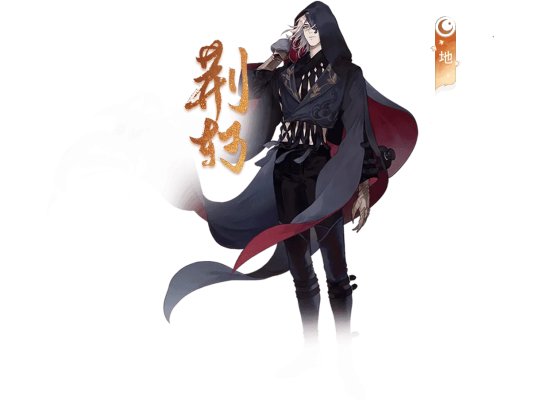
Died 227 BC
Retainer of Yan (Warring States)
Attempted to assassinate Qin Shi Huang
Song: Yi Shui Jue
Also appears in: Kuang Gu Hui Xiang
In-game rarity: 地
高渐离 | Gao Jianli | Cao Tiệm Ly
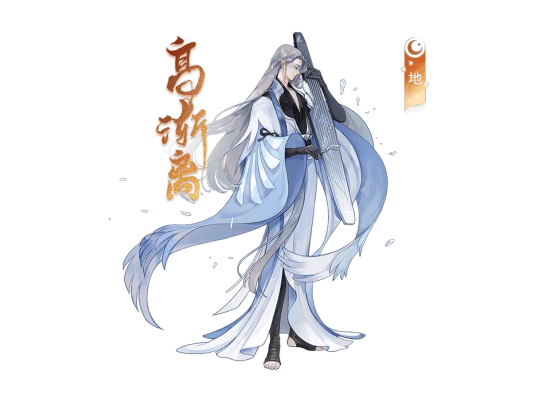
Musician of Yan (Warring States), friend of Jing Ke
Also attempted to assassinate Qin Shi Huang
Song: Yi Shui Jue
Also appears in: Kuang Gu Hui Xiang
In-game rarity: 地
干将 | Gan Jiang | Can Tương
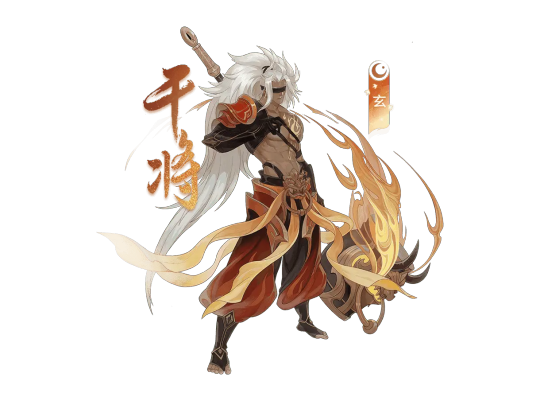
Part of a swordsmith couple during the Spring and Autumn period
Forged a pair of swords that also bore their names
Song: Wei Jian
Also appears in: Kuang Gu Hui Xiang
In-game rarity: 地
夫差 | Fuchai | Phù Sai
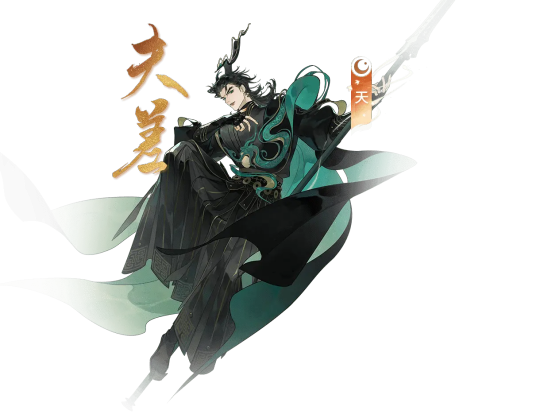
Reigned 495 BC – 473 BC
Last king of Wu (Spring and Autumn period)
Responsible for capturing and releasing Goujian, leading to the fall of his state
Song: Wen Jian Chun Qiu
Also appears in: Kuang Gu Hui Xiang
In-game rarity: 天
勾践 | Goujian | Câu Tiễn
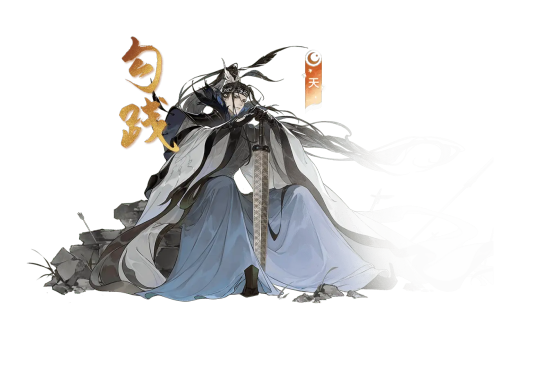
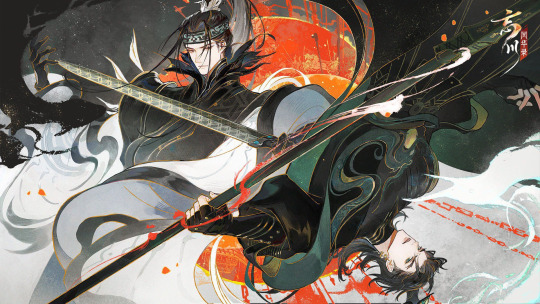
Reigned 496 BC – 465 BC
King of Wu (Spring and Autumn period)
Exacted revenge on and defeated Wu
Song: Wen Jian Chun Qiu
Also appears in: Kuang Gu Hui Xiang
In-game rarity: 天
伍子胥 | Wu Zixu | Ngũ Tử Tư
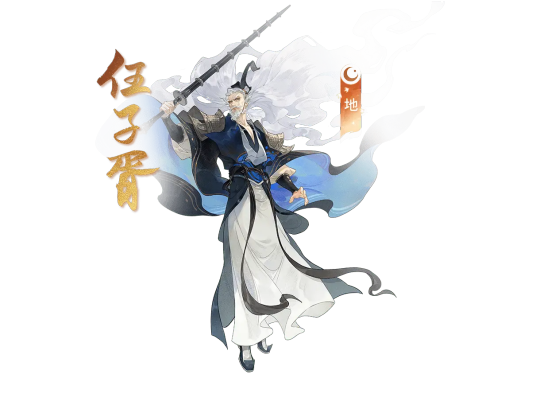
Died 484 BC
General and politician of Wu (Spring and Autumn period)
First served King Helü of Wu, was not entrusted by King Fuchai
Song: N/A
Also appears in: Wen Jian Chun Qiu
In-game rarity: 地
白起 | Bai Qi | Bạch Khởi
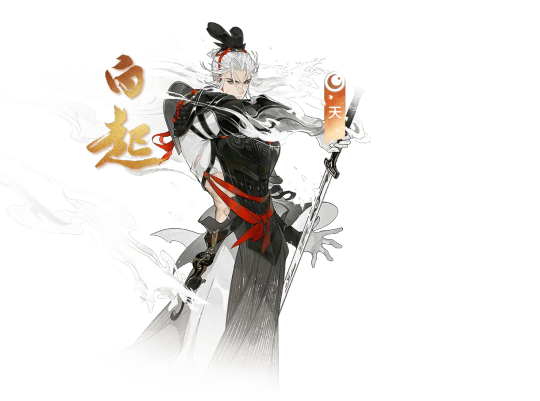
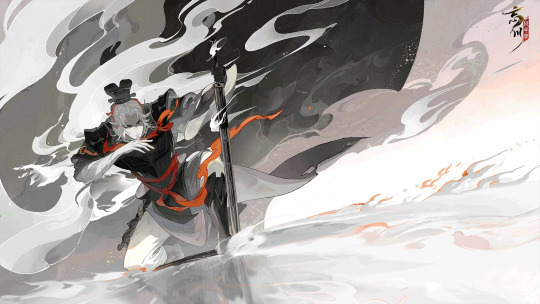

c. 332 BC –c. 257 BC
Military general of Qin (Warring States), whose victory paved way for the establishment of the Qin Dynasty
Extremely high kill count
Song: Qi Zhan Ling
Also appears in: Kuang Gu Hui Xiang
In-game rarity: 天
墨翟 | Mo Di | Mặc Địch
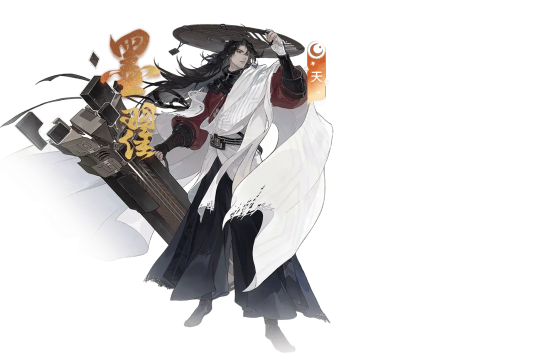
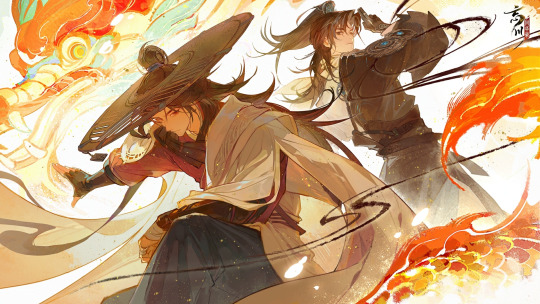
c. 470 BCE – c. 391 BCE
Also known as Mozi
Philosopher, founder of Mohism
Talented in carpentry
Song: Mo Yin Xia Sheng
In-game rarity: 天
公输班 | Gongshu Ban | Công Du Ban
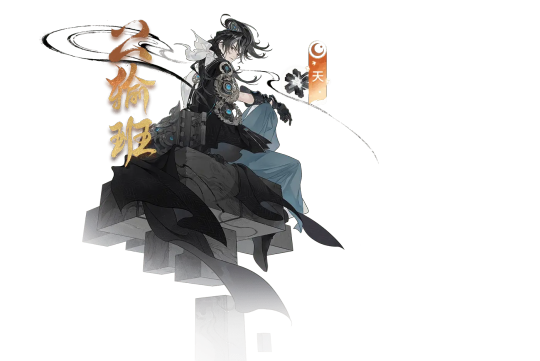
c. 507 BCE – 444 BCE
Also known as Lu Ban
Carpenter, engineer, inventor of several things including the saw
Song: N/A
Also appears in: Mo Yin Xia Sheng
In-game rarity: 天
庄周 | Zhuang Zhou | Trang Chu
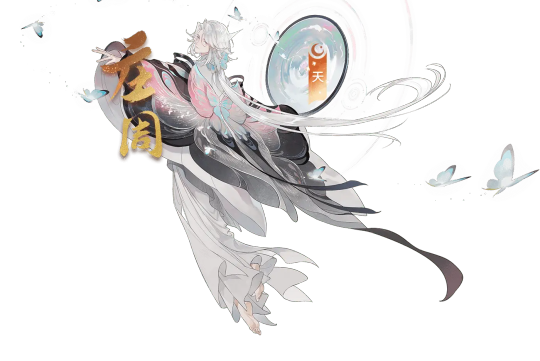
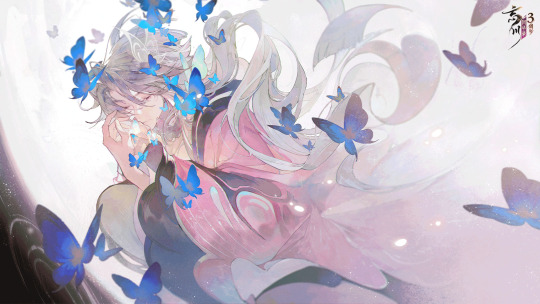
c. 369 BCE - c. 286 BCE
Also known as Zhuangzi / Chuang Tzu
Philosopher, author of Zhuangzi, established the foundation of Taoism
Song: N/A
In-game rarity: 天
4 notes
·
View notes
Text
XI SHI // ONE OF THE FOUR BEAUTIES OF CHINA
“She was one of the renowned Four Beauties of ancient China. She was said to have lived in a small Yue village (today part of Zhuji, a county-level city in Shaoxing, Zhejiang) during the end of the Spring and Autumn period. According to legend, Xi Shi was originally a girl who regularly washed gauze in the Huan Sha river. She was discovered by the Yue minister Fan Li and given to King Fuchai of Wu by King Goujian of Yue in a sexpionage operation which successfully brought down the State of Wu in 473 BC.”


0 notes
Text
Patterns and Endings
Xuefeng
June 8, 2020
(Translated by Qinyou and Edited by Kaer)
A pan is a pattern and a pancake is an ending; the size of the pan determines the size of the pancake. A puddle of water is a pattern and the fish in it are an ending; the depth and width of the water decides the size and quantity of the fish. Space is a pattern; if it is small, then it can only hold a grain of sand; if it is vast, then it can hold the sun, the moon, the earth, and all the stars and galaxies.
If a shepherd is jealous of another shepherd who has more sheep than he does, then he will never be more than a shepherd. If a beggar is jealous of another beggar who begs more successfully and gets more food than he does every day, then he will never be more than a beggar. If a monkey is jealous of another monkey whose butt is redder than his own, then he will never be more than a monkey.
We find that people who compare themselves to and are jealous of their peers have small patterns. They will always be what they are now because they cannot go beyond themselves. If a person is always comparing themselves with others, then they certainly cannot become a celestial, a Buddha, or a god, because their pattern is that of a human, not that of any of the other three; that is, their pot is the human pot, not the celestial or Buddha pot, so they cannot bake their bigger cakes.
A dog who is idle all day except to catch mice has the pattern of a cat and can become one; a wealthy landowner who looks down on the poor has the pattern of a rich man but cannot become a gentleman; a beautiful woman who satirizes people whose appearances are not as good as hers is physically beautiful but she has the pattern of a thorny vase and cannot become a lady.
It can be seen from this that those who look down upon and attack people who are less advantaged than they are, generally have very small patterns; therefore, those who look down upon and bully beggars and peasants in this world have small patterns and small futures. Those who challenge lions and those who challenge mice have different patterns and different endings. Those who challenge an emperor may become an emperor but those who challenge a beggar can only become a beggar.
There is an old saying that “peers are enemies”; in fact, those who regard peers as “enemies” do so because their patterns are small. The competition between peers is the cruelest in market competition. Sheep are not satisfied with goats’ farting, but they are all sheep and they are peers! Yesterday, as I browsed videos on the web, a famous internet figure whom I respected because he had produced several hundred high quality videos, had attacked another well-known videographer who had produced similar content. He said that the other guy was a liar and this collapsed my respect for him in an instant because he revealed that his pattern was smaller than I had expected. Those with such small patterns cannot let others live and work in peace and cannot let the world be clear and bright.
From this, I found a revelation; those who always praise and inspire others are people with big patterns but those who always suppress and attempt to destroy others are people with small ones. Those who have really big patterns acknowledge and praise their opponents and those who praise their enemies have limitless patterns.
We can thus infer these conclusions: those who have bad relationships with their colleagues have small patterns, as do those who belittle others, attack their peers, bully people who are weaker than they are, contend for profit among relatives and friends, like internal strife, and those who like to show off.
People with big patterns can endure humiliation on important tasks. A famous example is Han Xin who was humiliated by being forced to crawl between other men’s legs. To avoid wasting time and energy by bothering with those street thugs, he chose to endure crawling between their legs. Goujian, the king of the Yue kingdom, sleeping on the brushwood and tasting the gall, sent his wife to King Wu’s bed, and even tasted King Wu’s feces. Pu Songling, the author of “Strange Tales from a Lonely Studio”, who was repeatedly frustrated but never depressed, once composed a pair of couplets: “Where there is a will, there is a way, after burning one's Bridges, the 120 Qin Passes finally belonged to Chu” and “Heaven does not fail people who exert efforts, sleeping on the brushwood and tasting the gall, three thousand Yue soldiers conquered the Wu Kingdom”. We can see that his pattern was huge.
If you were walking along a road and someone hit you, what would you do? People with small patterns would immediately scold, “Are you blind?”, but those with large patterns would just smile and say: “I’m sorry, please forgive me for being in your way”. People with big patterns will have good endings; the bigger their pattern, the better their ending. With a small pattern, you can only march in place, or even retreat.
Do you want to be a Celestial Being? Then do not compare yourselves to others, do not make a fuss with others, and do not compete with others.

0 notes
Text
The Goujian Sword: A Timeless Testament to Ancient Craftsmanship
The Goujian Sword: A Timeless Testament to Ancient Craftsmanship
The Goujian Sword, a symbol of ancient Chinese craftsmanship, continues to captivate historians and enthusiasts alike. This legendary sword, named after the King of Yue, Goujian, is a testament to the advanced metallurgical skills of ancient China.To get more news about goujian sword, you can visit shine news official website.
The Goujian Sword was discovered in a tomb in Hubei province. Despite being buried for over two millennia, the sword was found in a remarkable state of preservation. The blade was still sharp, and there was no trace of rust, a testament to the superior craftsmanship of its makers.
The sword is a work of art, with intricate designs etched onto its blade and hilt. The hilt is bound with silk while the grip is made from blue crystals and turquoise. The blade is made of copper and tin, with a high tin content that gives the sword its sharpness and flexibility.
The Goujian Sword is not just a weapon, but a symbol of power and status. It was owned by King Goujian, a ruler known for his perseverance and resilience. The sword is said to embody his spirit, serving as a reminder of his legacy.
The discovery of the Goujian Sword has provided valuable insights into the advanced metallurgical techniques of ancient China. The sword's composition, craftsmanship, and preservation state have fascinated scientists and historians, prompting further research into ancient Chinese metallurgy.
In conclusion, the Goujian Sword is a timeless testament to ancient craftsmanship. It embodies the spirit of its owner, King Goujian, and serves as a symbol of power and status. Its remarkable state of preservation and intricate designs continue to captivate, making it a fascinating subject of study for historians and enthusiasts alike.
0 notes
Audio
Goujian’s this time to complete the set! (Previously: Yiguang, Wu Zixu, Chenfeng. With thanks again to @bamboocounting!)
Translation
*walking*
Great King, this humble criminal is here to wake you as you commanded!
*rustles* Great King? Great King? Tsk, sleeping like the dead, don’t you have any fear of enemy ambush--
Uu--What are you doing?! You scared me all of a sudden...
*awkward laughter*
This humble criminal would not dare rebuke his king. If you don’t believe me and insist on claiming I was ambushing you, I have no choice but to confess to it. But...
*rustle*
*kiss*
If I ambushed you this way, o Great King, would you be satisfied?
Chinese transcription below:
*walking* 大王,罪臣奉诏来叫你起床啦!*rustles* 大王?大王?啧,睡得这么死,也不怕敌人偷袭你了……唔--你干嘛?!突然间吓我一跳……*awkward laughter* 罪臣哪敢责怪大王啊,若是大王不信我,非说我偷袭,那我也只能承认了。不过……*rustle**kiss*这种偷袭方式,大王可满意?
31 notes
·
View notes
Photo







#qin's moon#9 songs of the moving heavens#gif#wuxia#Wei Zhuang#Goujian#King of Yue#fight scene#chinese animation#3D animation#qin's moon gif#sword fight#dual swords#Goujian is the first to actually wound Wei Zhuang#although Baifeng did make a scratch on Zhuang's face#xD#with the help of Moya of course
9 notes
·
View notes
Text
General- Fan Li; (Hanrei:范蠡) =Genius of the world (Essay)

Hanrei(范蠡/ copyright:kodansha)
Ancient China’s epiode, ancient China refers to the period from the Spring and Autumn Warring States period(春秋戦国時代) to the Tang period(唐時代). What is particularly interesting in the history of the Chinese war is neither the battle of Han Chu(漢楚の争い) (Xiang Yu VS Liu Kun:項羽VS劉邦) nor the Three Kingdoms(三国志) (Cao Cao VS Zhuge Liang:曹操V諸葛孔明). It is the Wu-Yue battle(呉越の争い) that was fought between the 6th and 5th centuries BC. Wu(呉) and Yue(越) were underdeveloped nations of China at that time, but the winners of these two nations, Yue, will chanting over chuugen (dominating China:中原の支配). The King of Wu was Fuchai(夫差), and the King of Yue was Goujian(勾践), both of whom were mediocre kings with weak wills. It was Wu: Wu Zixu(伍子胥) and Yue: Hanrei(范蠡) who made the two people excited.

Rei: bark beetle (etymology)
Wu Zixu was originally a Chu(楚) person, but he went into exile in Wu with a grudge against Chu King's outrage. He had an audience with Yue Wang to relieve his resentment (not yet in Goujian's place). Yue-Oh: "Can I lend a soldier for my grudge?" It was Hanrei who set out a boat for Wu Zixu who tried to commit suicide on the spot. Wu Zixu borrows Yue's soldiers. Yue Wang: "Look, you've been scratched soldiers meaninglessly." Hanrei: "What if we could buy 10 years of peace with this? It's cheap. While Wu was fighting, those kid boys I will be a peaceful soldier. ”Yue Wang:“ Hanrei, the man you are ... ”After that, when the situation became unfavorable to Yue, this“ lent soldier ”was used as a material to turn the situation over.
In addition, there were Confucius(孔子) and Sun Tzu(孫子) as Hanrei's contemporaries. Sun Tzu was a staff officer of Wu, but Hanrei understands his military art and deceives him to win. In addition, He decided the final battle with Wu in the words of the messenger of Confucius. And after making full use of all the tricks and winning brilliantly, he shook off Goujian 's detention and changed his name twice and became a millionaire. Hanrei can be said to be a genius of the world. Even from my point of view, it is an attractive character. In addition, Wu Zixu has a tragic end. Wu Zixu, who was given death by Fuchai, had suicided. "Hang my eyes on the gate. Watch Wu be destroyed by Yue." That's actually the case ... Hanrei was renamed "shiishihi:鴟夷子皮" for the first time, after Wu Zixu 's body was put in the skin(shiishihi) and thrown into the Changjiang River. I think it was a serious lesson. He finally calls himself Toshukou(陶朱公).
** I had a hard time because there were many kanji that were difficult to be converted between Japanese and Chinese.
#Hanrei#Fan-Li#范蠡#general#genius of the world#Spring and Autumn Warring States period#Wu-Yue battle#Confucius#Sun Tzu#millionaire#essay#rei morishita
4 notes
·
View notes
Text
Random Stuff #10: Daoist Elements and More in The Untamed/MDZS Part 2 - Weapons and Magical Objects
(Part 1 Here) (Super-long post ahead!)
Talismans/Charms/符箓/符咒
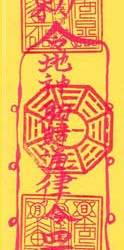

The talismans in both the live-action and animated shows originate from Daoist talismans, which in turn developed from early shamanistic traditions. Like what Lan Wangji tells Jiang Cheng in the show, real life Daoist talismans are usually made for beneficial purposes, one of which being to ward off evil spirits. Other purposes of such talismans include everything from curing illnesses to controlling floods to communicating with the gods. In order to call forth gods to accomplish these goals, writing/drawing on the talismans usually include “incantations” that start with “勅令”, or “command”, on the very top. The word can be traced back to 敕令, which refers to orders from an emperor, but since 敕 is traditionally reserved for the emperor, Daoists use 勅 on their talismans. The meaning is also slightly changed, as 敕 has 攵 on the right, implying the order is written; meanwhile 勅 has 力/force on the right, implying the order is executed by “force”.
The body of the talisman sometimes include complex combinations of Chinese characters (合体字/複文) that are more like visual symbols and do not have their own pronunciations. On a talisman these “combination characters” are usually arranged in a specific pattern. These combination characters aren’t exclusive to Daoism, however. Below is a well-known combination character created from the word 招財進寶 (lit: “gaining wealth and attracting riches”), commonly seen pasted on doors and windows around Chinese New Year for luck.
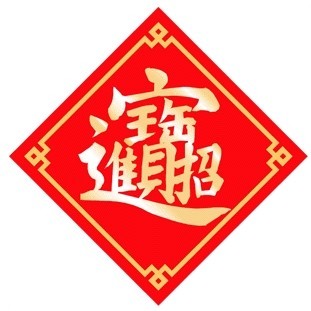
Other elements of a talisman are mostly made up of symbols such as the yinyang symbol, eight trigrams, and special strokes that also hold symbolic meaning.
A fun detail from the animated show: in the scene where Jiang Cheng shows the inverted evil-warding talisman to Lan Wangji, we can see that WWX’s addition in blood near the top turns the 人 part into 夷, as in 夷陵老祖/”Yiling Founder”, giving the viewer a solid hint as to who changed the talismans.
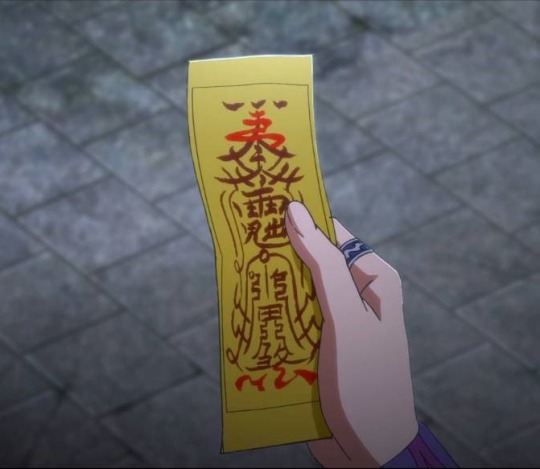
Sword (Jian)/剑
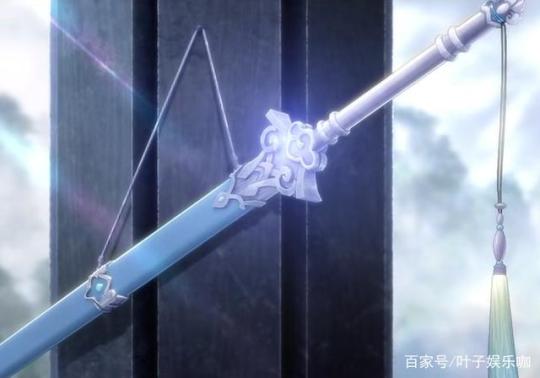
Jian sword refers specifically to pointed double-edged one-handed straight swords. The sword is important to religious Daoism, but its origin as a culturally-significant symbol lies in history.
The sword was an actual weapon used on the battlefield before Han dynasty (before 202 BC), and it was that time, long long ago, that the sword was associated with certain human qualities, such as an unyielding sense of justice. From there, the jian sword eventually became an ornamental item symbolizing high social status. Evidences of this can be found in the Book of Rites (《禮記》), a book detailing etiquettes and rituals for nobles of Zhou dynasty (1046-256 BC). For example, a chapter mentioned “when looking upon a gentleman’s attire, sword, and carriage horse, do not gossip about their value” (“觀君子之衣服,服劍,乘馬,弗賈”). One such decorative jian sword artifact even survived to this day:
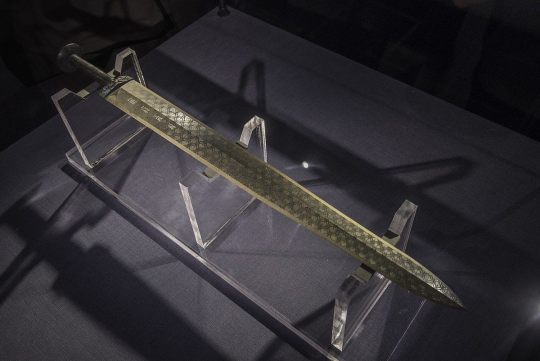
Sword of Goujian, King of Yue (越王勾践剑), part of the collection of Hubei Provincial Museum. Note: the engraved “bird-worm seal script” (鳥蟲篆; basically a highly decorative font) text says “Goujian, King of Yue, made this sword for his personal use” (戉王鸠浅,自乍用鐱).
By the Eastern Han dynasty (25-220 AD), Daoism had established itself as a folk religion. Many of the customs and etiquettes passed down from pre-Qin dynasty times were mystified and given religious importance in the then newly-established Daoist belief system, including the aforementioned etiquettes involving the jian sword. People came to believe the jian sword as holding magical properties, a weapon gifted by heaven itself, allowing its wielder (usually a Daoist priest) to fight and triumph over demonic spirits. As the jian sword became more and more of a Daoist ceremonial item than an actual weapon, it also slowly changed to this familiar form today:
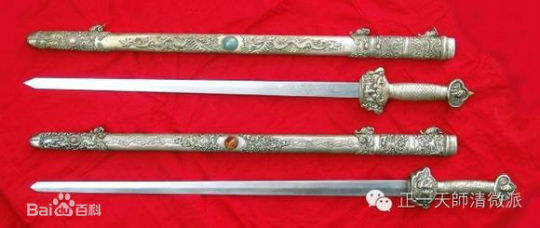
(Modern ceremonial Daoist jian swords. Fun fact: it is widely believed that jian swords made entirely of peach wood have better demon-banishing abilities than regular swords, since peach trees were said to have demon-warding effects.)
So, a sword that was worn to show respect, used to showcase social status AND have demon-warding powers? Does that sound familiar?
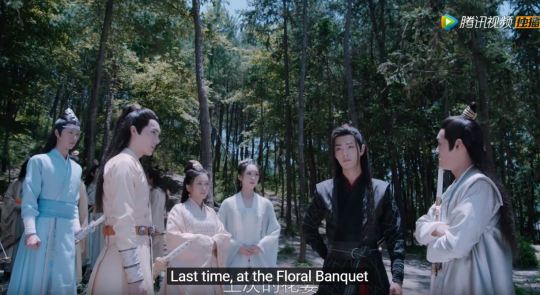





It was no accident that the day WWX refused to take his sword with him (since he gave his core to Jiang Cheng so Jiang Cheng could continue to use swords) was also the day the other sects/clans started to alienate him. The sword symbolized status, and WWX was only the son of a servant, a “lone genius” (一枝独秀/”a lone blooming branch”, in the words of Jiang Cheng) among all the young nobles, so it was fitting that WWX abandoned the “righteous” sword path to walk a new and unique path in order to reach his full potential.
“Fly whisk”/“duster”/fu chen/拂尘
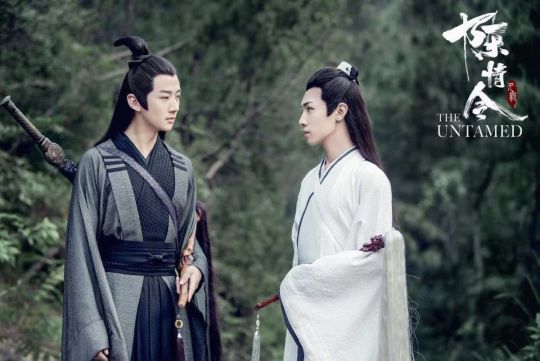
Remember the funny-looking duster-like objects that Song Lan and Xiao Xingchen held in the live action series? Those are called fu chen, or “拂尘” in Chinese, and hold symbolic meaning in Daoism. To explore that meaning, let’s first explain the name “fu chen”. Fu chen literally means “brush dust”, so the Chinese meaning is really more like “duster” than the common English translation of “fly whisk”. But then what sort of “dust” is it really “brushing”?
The concept of “dust” (尘) in both Daoism and Chinese Buddhism refers to the normal secular human society, with all of its material objects and worldly wants and worries. Thus, the symbolic meaning of fu chen/“duster” is to clear these worries and wants--in other words, worldly attachments--from one’s mind, allowing one to exit the secular world. For this reason, in China, the process of abandoning one’s normal life in society for the life of a Daoist priest or Buddhist monk is called “出家” (lit. “exiting home”) or “出世” (lit. “exiting world”; world here meaning society).
Since both Song Lan and Xiao Xingchen are Daoist priests (they were both referred to as “道长”), and both wandered through the world banishing evil rather than settling down somewhere and integrating into society, it was a nice choice to have them each hold a fu chen.
"Stygian Tiger Seal" or “Yin Tiger Seal”/阴虎符
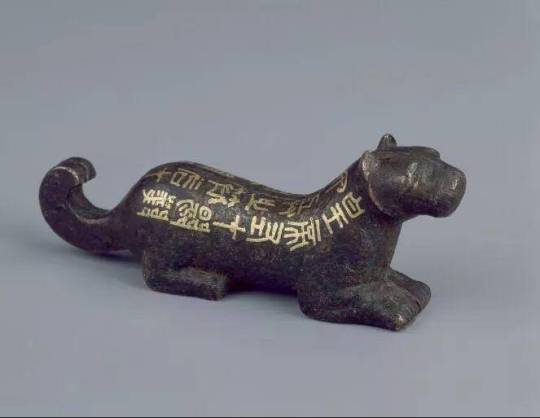
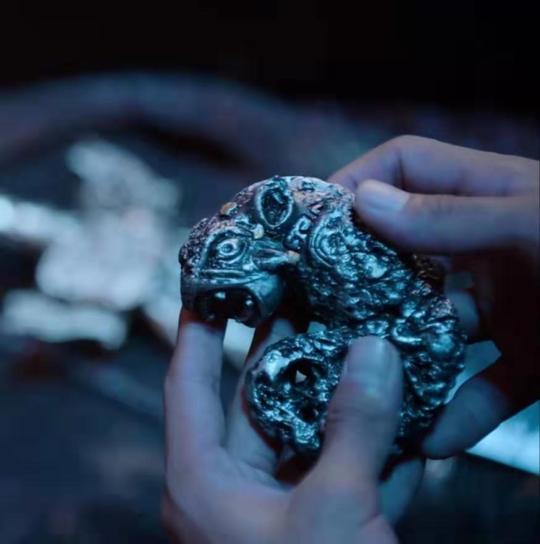
This one is a non-Daoist reference, but it’s still rooted in Chinese history, so here we go.
The fact that the Stygian Tiger seal is called a “tiger seal”/虎符 and has two halves that unleash powerful resentment energy when fitted together (this mechanism is present in both book and live-action but is absent in the animated show, where the two halves appear to be conjoined), points to the inspiration being the tiger amulet. In imperial China, tiger amulets/虎符 are metal tiger figurines that split into halves lengthwise, and serve the important purpose of approving military deployment. The imperial court would hold the right half, while the left half would be issued to military officials.
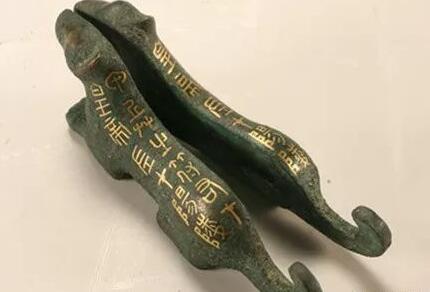
When army deployment is needed, the official would bring the left half of the figurine to the imperial court, and if it combines with the right half into a whole figurine, then the military deployment would be officially approved. Historically, tiger amulets are a security measure designed to give the imperial court control over the military.
Finally, some joke talismans I found on the web:
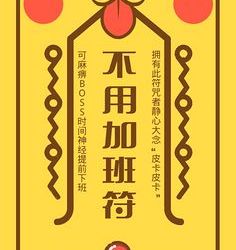
Translation: “No need to work overtime”; “hold the talisman and chant ‘PIKA PIKA’”, “will confuse your boss so you can get off work early”.
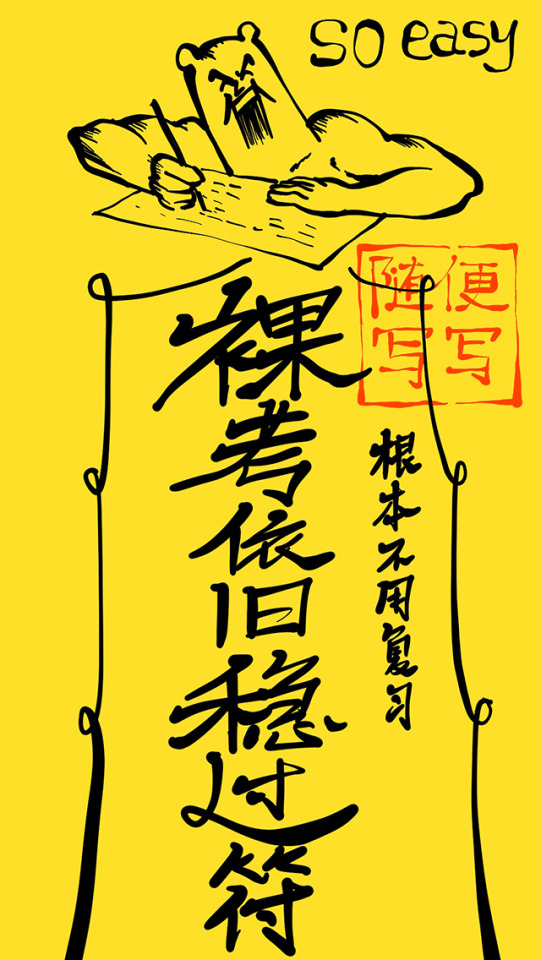
Translation: “passes exam without studying”, “bullshitting it”, “no need to study”. (I think I’ll need one of these lol................................)
3K notes
·
View notes
Photo

In the 5th century, King Goujian of Yue, would place convicted criminals at the front-lines of his armies and have them decapitate themselves in order to scare his enemies before battle.
225 notes
·
View notes
Text
Chen Lin’s Proclamation to Wu (Long Version, Scholarly Commentary)
This is a proclamation which appears in the Wenxuan or Selections of Refined Literature, a collection of outstanding poetry and prose from the sixth century. Among the entries in the Proclamations chapter of that text are three Three Kingdoms-related proclamations, two by Chen Lin and one by Zhong Hui. The first Chen Lin entry is his famous denunciation of Cao Cao on behalf of Yuan Shao. This is the other, an attempt to overawe Sun Quan’s subjects and encourage them to defect to Cao Cao.
This proclamation appears to have been written at the beginning of 217, shortly before the second Ruxukou campaign, especially since it mentions events up until that time and mentions Xiahou Yuan as still being alive. Curiously, Chen Lin seems to have ghostwritten the proclamation on behalf of Xun Yu, who would have died five years earlier. Either that detail is mistaken or I am.
This post includes the original text and additional scholarly commentary. There is a duplicate post which just contains the actual translation.
檄吳將校部曲文
Proclamation to the Generals, Officers, and Subordinates of Wu
陳孔璋
By Chen Kongzhang (Chen Lin)
年月朔日,子尚書令彧,告江東諸將校部曲及孫權宗親中外:
On the first day of the year, the Prefect of the Masters of Writing, Xun Yu, distributed this proclamation to the various generals, officers, and subordinates of the Southland and to Sun Quan's friends and relatives, both near and far:
〈魏志曰:荀彧,字文若,潁川人也,太祖進彧為漢侍中,守尚書令。〉
(The Records of the Three Kingdoms states that Xun Yu, styled Wenruo, was a native of Yingchuan commandary. Cao Cao promoted him to be a Palace Attendant of the Han dynasty, as well as acting Prefect of the Masters of Writing.)
蓋聞禍福無門,惟人所召。夫見機而作,不處凶危,上聖之明也;臨事制變,困而能通,智者之慮也;漸漬荒沈,往而不反,下愚之蔽也。是以大雅君子,於安思危,以遠咎悔;小人臨禍懷佚,以待死亡。二者之量,不亦殊乎!
"It has been said, 'Happiness and misery have no gate by which they must enter, but each man calls the one or the other for himself'. For the man who 'sees his opportunity and acts', rather than remain amidst adversity and peril, has the wisdom of a great sage; he who, faced with danger and pressed by circumstances, heeds the new situation only in the end, deserves the concern of the knowledgeable; and he who only plunges deeper into the muck and mire, never turning aside from doom, merits the annihilation of the foolish. Thus does the refined and superior gentleman consider danger even while at peace, and contemplates future regrets even when they seem remote, while the inferior man is caught unawares by misfortune and laments his loss, and in the end meets with death and destruction. Is there not a great divide between them?
〈左氏傳閔子騫之辭。〉〈周易曰:君子見機而作,不俟終日。〉〈漢書曰:江充因變制宜。周易曰:困而不失其所亨,其唯君子乎!王弼曰:窮必通也。〉〈班固漢書贊曰:大雅卓爾不群,河間獻王近之矣。封禪書曰:興必慮衰,安必慮危。〉
(The first quote is from Min Zima, as mentioned in the Zuo Commentary to the Spring and Autumn Annals (Xiang 23.10).
The Book of Changes states, "The superior fellow sees his opportunity and acts, and does not wait until his ruin."
The Book of Han states, "Jiang Tong adapted according to the situation." The Book of Changes states, "Is it not only the superior gentlemen who does not lose his way even when pressed by adversity?" Wang Bi remarked, "One who is exhausted will turn."
Ban Gu's commentary in the Book of Han states, "The refined fellow stands head and shoulders above the rest; Prince Xian of Hejian was close to being such a fellow." And the Book of Fengshan states, "During prosperity, one must consider decline; at peace, one must contemplate danger.")
孫權小子,未辨菽麥,要領不足以膏齊斧,名字不足以洿簡墨。譬猶鷇卵,始生翰毛,而便陸梁放肆,顧行吠主。謂為舟楫足以距皇威,江湖可以逃靈誅,不知天網設張,以在綱目,爨鑊之魚,期於消爛也。若使水而可恃,則洞庭無三苗之墟,子陽無荊門之敗,朝鮮之壘不刊,南越之旍不拔。昔夫差承闔閭之遠跡,用申胥之訓兵,棲越會稽,可謂強矣。及其抗衡上國,與晉爭長,都城屠於勾踐,武卒散於黃池,終於覆滅,身罄越軍。及吳王濞驕恣屈強,猖猾始亂,自以兵強國富,勢陵京城。太尉帥師,甫下滎陽,則七國之軍,瓦解冰冸,濞之罵言未絕於口,而丹徒之刃以陷其胸。何則?天威不可當,而悖逆之罪重也。
"Now Sun Quan is a mere whelp, and 'unable to distinguish beans from wheat'; he has not worth enough to 'douse the axe' of authority, nor reputation enough to impress anyone. He is a mere hatchling, still growing his adult feathers. Yet he would seek to wander about and do as he pleases, like a dog who barks at his master; he claims that his boats and ships will let him oppose the imperial majesty, and his rivers and lacks shall save him from august punishment. But he does not recognize that Heaven casts its net wide, and he shall be caught in it; he is nothing but a fish in the pot, who will cook when its time has come.
"Has he his rivers to protect him? Yet by the waters of Lake Dongting there remains not a trace of the three ancient states of Miao. Ziyang (Gongsun Shu) had the Jing Gate to guard him, yet he was defeated; Chaoxian (northern Korea) had their ramparts, but they availed them not; Nanyue had their banners, yet they too perished.
“In ancient times, the King of Wu, Fuchai, inherited the legacy of his father Helü and the trained army provided by Shen Xu (Wu Zixu), and he stood astride the region of Kuaiji. Certainly he could have been called a mighty king. Yet when he sought to prove whose was the premier state and struggled with Jin for supremacy, his capital city was sacked by Goujian of Yue and his soldiers were put to flight at Huangchi, and in the end his state was toppled and destroyed and his corpse fell into the hands of the Yue army.
“During the Han dynasty, there was the Prince of Wu, Liu Bi, who was proud, arrogant, and overbearing. Out of his ferocity and cunning, he sought to start disorder, for he believed that he had a strong army and a rich territory, and that he was powerful enough to bully the capital. But when the Grand Commandant (Zhou Yafu) led his army down to Xingyang, the armies of the seven states cracked like tiles and melted like ice, and before Liu Bi could even say a word of condemnation, his throat had already been cut by the blade of Dantu.
“What to make of the fate of such men? Merely this: that the might of Heaven cannot be opposed, and those who rebel against its will are great criminals indeed.
〈左氏傳曰:晉周子有兄而無慧,不能辨菽麥。〉〈漢書音義,服虔注曰:易曰:喪其齊斧。未聞其說。張晏曰:斧,鉞也,以整齊天下。應劭曰:齊,利也。虞喜志林曰:齊,側皆切。凡師出必齊戒入廟受斧,故曰齊斧也。〉〈爾雅曰:生而自食曰雛,待哺曰鷇。郭璞曰:鳥子須母食。鄭玄尚書大傳注曰:翰毛,毛長大者。〉〈西京賦曰:怪獸陸梁。戰國策,刁勃謂田單曰:跖之狗吠堯,非其主也。〉〈尚書,帝曰:咨禹,惟時有苗弗率,汝徂征。三旬苗民逆命,帝乃誕敷文德,七旬有苗格。孔安國曰:三苗之國,左洞庭,右彭蠡。范曄後漢書曰:公孫述,字子陽,自立為蜀王,遣任滿據荊門。帝令征南大將軍岑彭攻之,滿大敗。〉〈史記曰:天子拜涉何為遼東部都尉。朝鮮襲殺何。天子遣左將軍荀彘擊朝鮮,朝鮮人殺其王右渠來降,定朝鮮為四郡。又曰:南越呂嘉反,以主爵都尉楊僕為樓舡將軍,下橫浦,咸會番禺,南越以平,遂為九郡。又曰:東越王餘善反,遣橫海將軍韓悅出句章。越建成侯敖殺餘善,以其衆降。〉〈史記曰:吳王闔閭死,立太子夫差。又樂毅遺燕惠王書曰:昔伍子胥說聽於闔閭,而吳王遠跡至郢。韋昭國語注曰:申胥,楚大夫伍奢之子子胥也。名員。員奔吳,吳與地,故曰申胥。史記曰:吳王夫差伐越,敗之,越王勾踐乃以甲兵五千人棲於會稽。〉〈毛萇詩注曰:抗,舉也。鄭玄周禮注曰:稱上曰衡。抗衡,謂對舉以爭輕重也。史記,陸賈曰:以區區之越,與天子抗衡為敵國。又曰:吳王夫差北會諸侯於黃池,欲霸中國。吳王與晉定公爭長,乃長晉定公。吳引兵歸國。又曰:吳與晉人相遇黃池之上,吳、晉爭強,晉人擊之,大敗吳師。越王聞之,襲吳。吳王聞之,去晉而歸,與越戰,不勝,城門不守,遂圍王宮而殺夫差。〉〈漢書曰:吳王濞,高帝兄仲之子也,立濞為吳王。孝景五年,起兵於廣陵。左氏傳曰:鄭子太叔卒,晉趙簡子曰:黃父之會,夫子語我九言,曰:無始亂,無怙富。〉〈漢書曰:七國反書聞,天子遣條侯周亞夫往擊楚,敗之。七國:吳王濞、楚王戊、趙王遂、膠西王卬、濟南王辟光、淄川王賢、膠東王渠。〉〈漢書曰:吳王敗,乃與戲下壯士千人夜亡,渡淮,走丹徒,保東越。漢使人以利啗東越,東越即紿吳王。吳王出勞軍,漢使人鏦殺吳王。漢書,賈誼上疏曰:適啟其口,匕首已陷其胸矣。〉
(Regarding the phrase "unable to distinguish beans from wheat", the Zuo Commentary to the Spring and Autumn Annals mentions that a certain brother of Zhouzi of Jin "was devoid of intelligence, so that he could not distinguish beans from wheat".
Regarding "douse his axe", in the pronunciation commentary to the Book of Han, Fu Qian notes, "The Book of Changes states that 'he mourned his axe'." But I (the commentator) have not heard of this. Zhang Yan remarked, "The axe in this case is the military battle-axe, with which one brings order to the realm." Ying Shao remarked, "The character 齊 in this case means 'beneficial'." Yi Xi's Zhilin states, "齊 here means 'corresponding'. A commander who is about to go out invariably enters the temple and received the battle-axe, thus this term."
The Erya dictionary states, "Among birds, those who are able to feed themselves upon being born are called 雛 'chicks', while those who wait to be fed are called 鷇 'hatchlings'." Guo Pu remarked, "Baby birds wait for their mothers to feed them." Zheng Xuan's commentary to the Book of Documents states, "Adult feathers are those feathers that have grown long and large."
Chen Lin uses the term 陸梁 "wander about"; this appears in a verse in the Rhapsody on the Western Capital: "strange beasts wander about".
In the Strategies of the Warring States, Diao Bo says to Tian Dan, "The reason that Robber Zhi's dog barked at Yao was because Yao was not the dog's master."
Regarding the Miao states, the Book of Documents states, "The Emperor said, 'Alas! O Yu, there is only the lord of Miao who refuses obedience; do you go and correct him.' For thirty days, the people of Miao continued rebellious against the commands. But the Emperor set about diffusing on a grand scale the virtuous influences of peace, and in seventy days, the lord of Miao came and made his submission." Kong Anguo remarked, "These were the three Miao states; to their left was Lake Dongting, and to their right was Lake Pengli (Lake Poyang)."
Fan Ye's Book of Later Han states, "Gongsun Shu, styled Ziyang, declared himself King of Shu. He sent Ren Man to occupy the Jing Gate. But Emperor Guangwu sent his Grand General Who Conquers The South, Cen Peng, to attack the Jing Gate, and Ren Man was greatly defeated."
Regarding Chaoxian, the Records of the Grand Historian states, "Emperor Wu of Han appointed She He as Commandant of Liaodong, but Chaoxian surprise attacked and killed She He. Emperor Wu then sent his General of the Left, Xun Zhi, to attack Chaoxian. The people of Chaoxian killed their king Ugeo and came to surrender, and Chaoxian was thus organized into four commandaries."
And regarding Nanyue, it states, "Lü Jia of Nanyue rebelled against the Han dynasty. Emperor Wu appointed his Commandant of Titles, Yang Pu, as General of Tower Ships, and Yang Pu sailed down to Hengpu and then rendezvoused at Panyu. Nanyue was pacified, and organized into nine commandaries." It also states, "The King of Dongyue (or Minyue), Yushan, rebelled. Emperor Wu sent his General Who Crests The Yangzi, Han Yue, out to Gouzhang. Dongyue's Marquis of Jiancheng killed Yushan and led his forces to surrender."
The Records of the Grand Historian mentions that when King Helü of Wu passed away, his Crown Prince, Fuchai, succeeded him. And the Yan general Yue Yi mentioned in a letter to King Hui of Yan that "Wu Zixu gained the ear of Helü, and thus the King of Wu was able to launch a distant campaign and capture the Chu capital at Ying." Wei Zhao's commentary on the Discourses of the States states, "Shen Xu was the son of the great Chu minister Wu She, named Wu Zixu; his given name was Yuan. When Wu Yuan fled Chu and sought refuge in Wu, Wu granted him a fief, thus he also became known as Shen Xu." The Records further states, "When King Fuchai of Wu campaigned against Yue and defeated them, King Goujian of Yue led five thousand armored soldiers to perch at Kuaiji."
The commentary to the Mao edition of the Book of Poetry states, "To oppose is to contend." Zheng Xuan's commentary to the Rites of Zhou states, "To claim supremacy is to oppose. By thus opposing, one sought to see whose side was strongest." In the Records of the Grand Historian, Lu Jia states, "This pathetic little region of Yue dares to contend with the Son of Heaven as an enemy."
The Records also states, "King Fuchai of Wu went north to the conference of feudal lords at Huangchi, where he sought to claim status as Hegemon of the Middle Kingdom. He contended with Duke Ding of Jin for supremacy, but Duke Ding proved the victor. Wu thus led its troops home again." It further states, "When Wu encountered the people of Jin above Huangchi, the two sides fought for dominance; the people of Jin attacked the Wu soldiers, and greatly defeated their army. When the King of Yue (Goujian) learned of this, he led a surprise attack against Wu. Upon hearing this, the King of Wu (Fuchai) left Jin and returned to attack Yue. But he was unsuccessful; the city gates could not hold, and the Yue army besieged the palace and killed Fuchai."
The Book of Han states, "The Prince of Wu, Liu Bi, was the son of Emperor Gaozu's (Liu Bang's) elder brother Liu Zhong, and he was appointed as the Prince of Wu. In the fifth year of Emperor Jing's reign (154 BC), Liu Bi rose up with troops at Guangling."
The Zuo Commentary states, "When Zitaishu of Zheng passed away, Zhao Jianzi of Jin said, 'At the meeting of Huangfu, he told me, "Do not begin disorder, do not trust in riches".'"
The Book of Han states, "When word reached the capital of the Rebellion of the Seven States, Emperor Jing sent the Marquis Xiao, Zhou Yafu, to attack the Prince of Chu, and Zhou Yafu defeated him." The Seven States were the Prince of Wu, Liu Bi, the Prince of Chu, Liu Wu, the Prince of Zhao, Liu Sui, the Prince of Jiaoxi, Liu Ang, the Prince of Jinan, Liu Piguang, the Prince of Zichuan, Liu Xian, and the Prince of Jiaodong, Liu Qu.
The Book of Han further states, "When the Prince of Wu was defeated, he fled through the night with a thousand strong fellows and crossed the Huai River to flee to Dantu, where he sought refuge in Dongyue. But Han sent envoys to persuade Dongyue, who surrendered the Prince of Wu to them. When the Prince of Wu was about to come out and rebuke the troops, an agent was sent to kill him with a short spear." Elsewhere in the Book of Han, Jia Yi mentions in a petition that "He was just about to open his mouth when his neck was suddenly pierced.")
且江湖之衆,不足恃也,自董卓作亂,以迄於今,將三十載。其間豪桀縱橫,熊據虎跱,強如二袁,勇如呂布,跨州連郡,有威有名,十有餘輩。其餘鋒捍特起,鸇視狼顧,爭為梟雄者,不可勝數。然皆伏鈇嬰鉞,首腰分離,雲散原燎,罔有孑遺。近者關中諸將,復相合聚,續為叛亂,阻二華,據河渭,驅率羌胡,齊鋒東向,氣高志遠,似若無敵。丞相秉鉞鷹揚,順風烈火,元戎啟行,未鼓而破。伏尸千萬,流血漂樐,此皆天下所共知也。是後大軍所以臨江而不濟者,以韓約馬超逋逸迸脫,走還涼州,復欲鳴吠。逆賊宋建,僭號河首,同惡相救,並為脣齒。又鎮南將軍張魯,負固不恭。皆我王誅所當先加。故且觀兵旋旆,復整六師,長驅西征,致天下誅。偏將涉隴,則建約梟夷,旍首萬里;軍入散關,則群氐率服,王侯豪帥,奔走前驅。進臨漢中,則陽平不守,十萬之師,土崩魚爛,張魯逋竄,走入巴中,懷恩悔過,委質還降;巴夷王朴胡賨邑侯杜濩,各帥種落,共舉巴郡,以奉王職。鉦鼓一動,二方俱定,利盡西海,兵不鈍鋒。若此之事,皆上天威明,社稷神武,非徒人力所能立也。
"Nor can Sun Quan be secure in the power of his army. After all, it has been nearly thirty years by now since Dong Zhuo first began the turmoil. And during that time, great heroes and talents roamed the length and breadth of the land, territorial as bears and implacable as tigers. The most powerful among them were those like the two Yuans (Yuan Shao and Yuan Shu), and the strongest were those like Lü Bu; for more than ten years, they stood astride several provinces, and they wielded power and commanded respect. Even beyond them, there were many remarkable heroes with passion and zeal, gazing like owls and glancing like wolves, and in this struggle for heroic supremacy there were too many people to count. Yet in the end, every one of them fell under the axe and parted with their heads; the clouds dispersed and the plains were scorched, and not a man remained among them.
"More recently, there were the generals of Guanzhong (Ma Chao and his allies), who banded together to rebel and cause chaos. They blocked the two Huas (Huayin and Huayang), occupied the Yellow and Wei Rivers, led the Qiang and other tribes to charge forward, and pushed their vanguard towards the east. They possessed towering zeal and lofty ambitions, and it seemed as though no one could stand against them. Yet the Prime Minister (Cao Cao) took up the military battle-axe and spread the word, and, sure as wind and blazing as fire, he 'led the way in front' and routed the foe before a roll of the drums. The result was 'a heap of corpses by the thousands and tens of thousands, of flowing blood and discarded shields'. These are things which all the realm well knows.
"Later, when the grand army had come to the banks of the Yangzi but had not yet crossed, Han Yue (Han Sui) and Ma Chao scampered off and fled back to Liangzhou, where they once again sought to caw and bark. The traitor and bandit Song Jian, who had declared himself King of the Source of the Yellow River, formed common cause with their evil; they helped each other as the lips support the teeth. It was the same way with the General Who Guards The South, Zhang Lu, who was confident in his defenses and so refused to respect royal authority. These enemies were all deserving of our royal punishment. Thus the Prime Minister merely reviewed the troops and made a demonstration at the Yangzi, then once again put the royal armies in order and charged to the west on campaign, to inflict the punishment of the realm against these foes.
"What were the results? No sooner had mere subordinate generals crossed the Long Mountains when Song Jian and Han Sui parted with their heads, and their heads and banners were sent ten thousand li to us. The moment that our army entered San Pass, the various Di tribes came to submit to us, and their kings, nobles, chiefs, and leaders all fled in the face of our advance. When we advanced to Hanzhong, Yangping Gate fell before us; Zhang Lu's army of a hundred thousand men was no more than fallen earth or rotting fish. Zhang Lu himself scurried away, fleeing into Bazhong, but then cherishing the kindness that he had been shown and repenting of his transgressions, he brought his whole family and returned to surrender. The King of the the tribes of Ba, Pu Hu, and the Marquis of the Cong tribes, Du Huo, each led their forces to come and submit, presenting up Ba commandary, and these leaders were employed in office. Thus with one blow of the horns and one roll of the drums, these two corners of the realm were all pacified; we reaped the full bounty of the western sea without even a clash of the vanguards.
"Such things as these only come about through the might and wisdom of Heaven above and the martial prowess of the very spirits of state; they are not something that the power of a mere mortal can accomplish.
〈二袁,袁紹、袁術也。魏志曰:呂布便弓馬,旅力過人,號為飛將。〉〈淮南子曰:鴟視虎顧。鹽鐵論曰:無鹿駭狼顧之憂。〉〈尚書曰:若火之燎于原。毛詩曰:周餘黎民,靡有孑遺。〉〈魏志,張魯據漢中,遣鍾繇討之。是時關中諸將,疑繇欲自襲馬超,遂與楊秋、李湛、宜成等反。遣曹仁討之。超等屯潼關,公敕諸將:關西兵精悍,堅壁勿與戰。〉〈魏志曰:公西征馬超。公自潼關北度,未濟,超赴船急戰。丁斐曰:放馬以餌賊。賊亂取馬,公乃得渡,循河為甬而南。賊追距渭口,公乃分兵結營於渭南。賊夜攻營,伏兵擊破之,進軍渡渭。超等數挑戰,不許,公乃與克日會戰。先以輕兵挑之,戰良久,乃縱彍騎夾擊,大破之,斬宜成、李湛等。漢書,元后詔曰:運獨見之明,奮無前之威。毛詩曰:武王載旆,有虔秉鉞,如火烈烈,則莫我敢遏。又曰:元戎十乘,以先啟行。〉〈戰國策,秦王謂唐且曰:天子之怒,伏尸百萬,流血千里。賈誼過秦曰:伏尸百萬,流血漂樐。〉〈魏志曰:曹公斬宜成,遂、超走涼州。典略曰:韓遂,字文約,在涼州阻兵為亂,積三十年,建安二十年乃死。〉〈魏志曰:初,隴西宋建自稱河首平漢王,聚衆枹罕。夏侯淵討之,屠枹罕,斬建涼州。〉〈魏志曰:張魯,字公旗,據漢中,以鬼道教人,自號師君。長雄巴漢,垂三十年,漢末力不能征,遂就寵魯為鎮民中郎將。漢寧,太祖征之。周禮曰:負固不服則攻之。〉〈魏志曰:建安十七年,公征孫權,攻破江西營,乃引軍還。史記曰:武王東觀兵至于孟津。諸侯皆曰:帝紂可伐。武王曰:未可。乃還師。〉〈魏志曰:建安二十年,公西征張魯。〉〈魏志曰:韓遂在顯親,夏侯淵欲襲取之,遂走。後淵大破遂軍,得其旍麾。斬建及遂死,已見上文。〉〈魏志曰:公西征張魯,自陳倉出散關至河池。氐王竇茂恃險不服,攻屠之。〉〈魏志曰:西征張魯,至陽平,魯使弟衛據陽平關,公乃遣高祚等乘險夜襲,大破之。〉〈魏志曰:魯弟衛夜遯。魯潰走巴中,遣人慰喻。魯盡家屬出降。土崩,已見上文。公羊傳曰:其言梁亡何?自亡也。奈何?魚爛而亡。何休曰:魚爛從內發。左氏傳,狐突曰:策名委質。〉〈魏志曰:建安二十年,七姓巴夷王朴胡、賨邑侯杜濩舉巴夷、賨民來附。於是分巴郡,以胡為巴東太守,濩巴西太守。孫盛曰:朴音浮。濩音護。〉〈戰國策,司馬錯曰:今伐蜀,利盡西海,而諸侯不以為貪。漢書,淮南王安上疏曰:不勞一卒,不頓一戟。又曰:不挫一兵之鋒。鈍與頓同。〉
(The "two Yuans" were Yuan Shao and Yuan Shu.
The Biography of Lü Bu in the Records of the Three Kingdoms states, "Lü Bu was skilled at archery and riding, and his strength surpassed that of others. People called him the Flying General."
The phrase "gazing like owls and glancing like wolves" comes from the Huainanzi. And the Discourses on Salt and Iron has a similar phrase: "There were be no cause for concern of 'the skittishness of a deer or the glancing of a wolf'."
The Book of Documents has the phrase, "like a fire that scorches the plains". And the Mao edition of the Book of Poetry has the verse, "Of the remnant of Zhou, among the black-haired people, there will not be half a man left".
The Records of the Three Kingdoms describes the uprising of the Guanzhong generals: "When Zhang Lu occupied Hanzhong, Cao Cao sent Zhong Yao to campaign against him. But at that time, the generals of Guanzhong suspected that Zhong Yao really intended to launch a surprise attack against Ma Chao. So Ma Chao banded together with Yang Qiu, Li Zhan, Yi Cheng, and others and rebelled. Cao Cao sent Cao Ren to campaign against them. Ma Chao and the others camped at Tong Gate. Cao Cao ordered his generals, 'The soldiers of Guanxi have keen zeal; keep fast to your defenses, and do not fight them.'"
The Records continues, "Cao Cao came west to campaign against Ma Chao. Cao Cao was going to cross the Yellow River north of Tong Gate, but before, Ma Chao's fleet arrived and brought on a fierce battle. Ding Fei advised him, 'Scatter your horses to entice the rebels.' So Cao Cao scattered his horses, and the rebels scrambled to take them, thus allowing Cao Cao to get across the river, then follow it to the south. The rebels pursued him and opposed him at Weikou, so Cao Cao divided his troops and arranged a camp at Weinan. The rebels attacked the camp during the night, but troops lying in ambush attacked and routed them. Cao Cao then advanced and crossed the Wei River as well. Ma Chao and the others repeatedly sought battle; Cao Cao kept putting them off, but eventually agreed, and on the arranged date the two sides met in battle. Cao Cao initially sent some light troops forward to skirmish with the enemy, but after the battle had dragged on for some time, he had his cavalry attack from the flanks, greatly routing the rebels. He took the heads of Yi Cheng, Li Kan, and others.
In the Book of Han, the edict of Empress Yuan has the phrase "zealous as though no one can stand before them". The Mao edition of the Book of Poetry has the verse, "The martial king displayed his banner, and with reverence grasped his axe. It was like a blazing fire, which no one can repress." And again, "Ten large war chariots led the way in front.”
In the Strategies of the Warring States, the King of Qin says to Tang Ju, "The anger of the Son of Heaven leads to a heap of corpses by the hundreds and tens of thousands, and flowing blood for a thousand li." Jia Yi's essay The Faults of Qin has a similar phrase: "a heap of corpses by the hundreds and tens of thousands, of flowing blood and discarded shields".
The Records of the Three Kingdoms states, "After Cao Cao beheaded Yi Cheng, Han Sui and Ma Chao fled to Liangzhou." The Dianlue states, "Han Sui, styled Wenyue, occupied Liangzhou and raised troops in rebellion for thirty years. He died in the twentieth year of Jian'an (215)."
The Records continue, "Earlier, Song Jian of Longxi had declared himself King of the Source of the Yellow River Who Pacifies the Han Dynasty, and he had gathered an army at Fuhan. Xiahou Yuan campaigned against him; he sacked Fuhan and took Song Jian's head."
The Records continue, "Zhang Lu, styled Gongqi, occupied Hanzhong. He instructed the people in mystic arts, calling himself Instructor and Master. He stood tall over the regions of Ba and Han for nearly thirty years. Since in the final years of the Han dynasty the court was not strong enough to campaign against him, they appeased Zhang Lu by appointing him as General of the Household Gentlemen Who Guards The People. But after Han had been settled, Cao Cao campaigned against him." The Rites of Zhou states, "Whomever relies upon their defenses and refuses to submit, attack them."
The Records continue, "In the seventeenth year of Jian'an (212), Cao Cao campaigned against Sun Quan. He attacked and routed Sun Quan's camps north of the Yangzi, then led his army back again." Chen Lin alludes to an account from the Records of the Grand Historian: "King Wu of Zhou reviewed his troops at Meng Crossing. The nobles all told him, 'Now is the time to campaign against King Zhou of Shang.' But King Wu told them, 'The moment is not right.' And he led his army back again."
The Records continue, "In the twentieth year of Jian'an (215), Cao Cao campaigned west against Zhang Lu."
The Records continue, "Han Sui was at Xianqin. Xiahou Yuan wished to launch a surprise attack and capture him, so Han Sui fled. Later, Xiahou Yuan greatly routed Han Sui's army and captured his banners and flags." This led to the deaths of Song Jian and Han Sui, as mentioned above.
The Records continue, "When Cao Cao campaigned against Zhang Lu, he marched from Chencang, came out through San Pass, and advanced to Hechi. The King of the Di, Dou Mao, was confident of his defenses and would not submit. Cao Cao attacked and slaughtered him."
The Records continue, "During the campaign against Zhang Lu, Cao Cao came to Yangping. Zhang Lu sent his younger brother Zhang Wei to occupy Yangping Gate. Cao Cao then sent Gao Zuo and others to slip through the terrain and launch a surprise night attack, and they greatly routed Zhang Wei. Zhang Wei fled through the night. Zhang Lu fled to hide in the Ba region, while sending envoys to smooth relations. He then brought his whole family out to surrender."
The simile of fallen earth has already been mentioned above. Regarding rotting fish, the Gongyang Commentary to the Spring and Autumn Annals states, "In what way did he say that Liang would fall? From self-destruction. What would that be like? Like a fish which rots before it dies." He Xiu remarked, "Fish rot from the inside out."
The Zuo Commentary states, "To demonstrate his loyalty, the new officer wrote his name on a plaque and presented a sacrifice."
The Records continue, "In the twentieth year of Jian'an (215), the King of the seven tribes of the Ba region, Pu Hu, and the Marquis of the Cong people, Du Huo, led the tribes of Ba and the Cong people to come and submit to Cao Cao. Cao Cao thus split Ba commandary in half; he appointed Pu Hu as Administrator of Badong, and Du Huo as Administrator of Baxi." Sun Sheng remarked, "Pu Hu's surname 朴 is pronounced 'fu', and Du Huo's given name 濩 is pronounced 'hu'."
In the Strategies of the Warring States, Sima Cuo states, "If you now campaign against Shu, you will reap all the bounty of the western sea, which the feudal lords have no greed for."
In the Book of Han, the Prince of Huainan, Liu An, has a petition which includes the phrases, "trouble not a single soldier, nor set a single spear", and "seek not a single clash of weapons".)
聖朝寬仁覆載,允信允文,大啟爵命,以示四方。魯及胡濩皆享萬戶之封,魯之五子,各受千室之邑,胡濩子弟部曲將校為列侯將軍已下千有餘人。百姓安堵,四民反業。而建約之屬,皆為鯨鯢;超之妻孥,焚首金城,父母嬰孩,覆尸許市。非國家鍾禍於彼,降福於此也,逆順之分,不得不然。夫鷙鳥之擊先高,攫鷙之勢也;牧野之威,孟津之退也。今者枳棘翦扞,戎夏以清,萬里肅齊,六師無事。故大舉天師百萬之衆,與匈奴南單于呼完廚及六郡烏桓丁令屠各,湟中羌僰,霆奮席卷,自壽春而南。又使征西將軍夏侯淵等,率精甲五萬,及武都氐羌,巴漢銳卒,南臨汶江,搤據庸蜀。江夏襄陽諸軍,橫截湘沅,以臨豫章,樓船橫海之師,直指吳會。萬里克期,五道並入,權之期命,於是至矣。
"And how generous and benevolent the court is; most impartial, fully civil and fully trustworthy, and greatly willing to grant titles as a display to all the realm. Having submitted to the dynasty, Zhang Lu, Pu Hu, and Du Huo were all granted fiefs of ten thousand households, Zhang Lu's five sons were all granted fiefs of a thousand households, and more than a thousand of the relatives and subordinates of Pu Hu and Du Huo were granted titles from minor marquises and generals on down. Thus were the people able to enjoy tranquility, and the Four Professions returned to their livelihoods. But as for those who rebelled, Song Jian and Han Yue (Han Sui) and their ilk were all 'buried under a mound', while Ma Chao's wife and children were beheaded at Jincheng and his parents and infants were executed in the Xu marketplace. These were not merely the whims of the state to inflict misfortune here and bestow blessings there; they were the just fruits of the submissive and the traitorous.
"Before it snatches its prey, a raptor will often first ascend in order to muster its full power. Likewise, before King Wu of Zhou's ultimate victory at Muye, he first withdrew from Meng Crossing. So too have we been clearing the brambles and cutting away the thorns, restoring peace among the tribes and the Xia (ethnic Han), such that now all the territory for ten thousand li around has become respectful and submissive, and there is no military trouble to be found.
"And now (~217) we have brought forth this heavenly army against you, one million strong, bolstered with the support of the Chanyu of the Xiongnu, Huwanchu (Huchuquan), the various tribes of the six commandaries, the Wuhuan, the Dingling, and the Chuge, and the Qiang and Bo tribes of Huangzhong. Like the rolling of thunder and the unfurling of a mat, we have swept south from Shouchun. At the same time, the General Who Conquers The West, Xiahou Yuan, and others are leading forth fifty thousand elite armored soldiers. The Di and Qiang tribes of Wudu and the zealous troops of the Ba and Han regions are marching south to the Wen River and the Yangzi to swiftly occupy the regions of Tang and Shu. The armies of Jiangxia and Xiangyang are also on the move, crossing the Xiang and Yuan Rivers and approaching Yuzhang. Lastly, our great fleet of tower ships is skirting the coast of the sea and heading straight for the regions of Wu and Kuaiji. All along this front of ten thousand li, we march as one, advancing along five routes against us. Sun Quan's fate is now at hand.
〈春秋考異郵曰:赤帝之精,寬仁大度。禮記曰:天無私覆,地無私載。毛詩曰:允文允武,昭假列祖。〉〈魏志曰:胡、濩者皆封列侯。又曰:封魯及五子皆為列侯。〉〈漢書曰:高祖入關,吏民皆安堵如故。管子曰:士農工商四民者,國之石民。〉〈左氏傳,楚子曰:古者明王伐不敬,取其鯨鯢而封,以為大戮。〉〈魏志曰:南安趙衢討超,梟其妻子。漢書有金城郡。〉〈范曄後漢書曰:建安元年,遷都于許。〉〈漢書,涓勳曰:甚誖逆順之理。〉〈此述往年未伐之意。尚書序曰:武王與受戰於牧野。又曰:惟十有一年,武王伐殷。孔安國曰:諸侯僉同,乃退以示弱。〉〈枳棘,以喻殘賊也。翦扞,翦除而防衛之也。〉〈魏志曰:建安二十一年治兵,遂征孫權也。〉〈魏志曰:建安二十一年,匈奴南單于呼廚泉將其名王來朝,待以客禮。漢書曰:諸羌言願得度湟水北。然湟水左右,羌之所居。丁令、屠各,已見上文。〉〈漢書,九江郡有壽春邑。〉〈魏志曰:夏侯淵,字妙才,惇族弟也,為征西將軍。〉〈魏志曰:建安二十一年,留夏侯淵屯漢中。〉〈漢書曰:東越反,上遣橫海將軍韓說、樓船將軍楊僕,入軍於越。〉〈大舉天師至壽春而南,一道也;使征西甲卒五萬,二道也;及武都至庸蜀,三道也;江夏至豫章,四道也;樓船至會稽,五道也。〉
(The Textual Analysis of the Spring and Autumn Annals states, "The essences of the Red Emperor were magnanimity, benevolence, and great capacity." The Book of Rites states, "Heaven overspreads all without partiality; Earth sustains and contains all without partiality." The Mao edition of the Book of Poetry has the verse, "With great qualities truly civil and martial, brilliantly he affects his meritorious ancestors."
The Records of the Three Kingdoms states, "The followers of Pu Hu and Du Huo were all appointed as minor marquises." It further states, "Zhang Lu and his five sons were all appointed as minor marquises."
The Book of Han states, "When Gaozu (Liu Bang) entered Guanzhong, the officials and the people all enjoyed their past tranquility again." The Guanzi states, "The Four Professions are the foundation of the state: they are the scholar-officials, the farmers, the artisans, and the merchants."
In the Zuo Commentary, the Viscount of Chu says, "In ancient times, when the intelligent kings punished disrespectful and disobedient states, they took the greatest criminals among them, and buried them under a mound as the greatest punishment."
The Records continue, "Zhao Qu of Nan'an commandary campaigned against Ma Chao, and beheaded his wife and children." The Book of Han lists a Jincheng commandary.
Fan Ye's Book of Later Han states, "In the first year of Jian'an (196), the capital was moved to Xu."
In the Book of Han, Juan Xun says, "Nothing can be more perverse than treason."
Beginning with the description of the raptor, Chen Lin is now describing the coming campaign against Wu. The Book of Documents states, "King Wu of Zhou did battle with King Zhou of Shang at Muye." It also states, "Not until the eleventh year did King Wu campaign against Yin (Shang)." Kong Anguo remarked, "The lords all agreed, and King Wu withdrew from Meng Crossing as a sign of weakness."
"Clearing the brambles" meant eliminating the various bandits and rebels, and "cutting away the thorns" mean nipping future threats in the bud and guarding against them.
The Records continue, "In the twenty-first year of Jian'an (216), Cao Cao prepared his troops, then led a campaign against Sun Quan."
The Records continue, "In the twenty-first year of Jian'an (216), the Chanyu of the Xiongnu, Huquchuan, led his famous nobles to come to court, and was treated as an honored guest." The Book of Han states, "The various Qiang tribes are said to have crossed over to the north of the Huang River." So the Qiang must have dwelled on either side of the river. The Dingling and Chuge people were mentioned above.
According to the Book of Han, the city of Shouchun was in Jiujiang commandary.
According to the Records of the Three Kingdoms, "Xiahou Yuan, styled Miaocai, was the younger kinsman of Xiahou Dun, and was appointed as General Who Conquers The West."
The Records continue, "In the twenty-first year of Jian'an (216), Xiahou Yuan was left to guard Hanzhong."
The Book of Han states, "When the state of Dongyue (Minyue) rebelled, Emperor Wu of Han sent the General Who Crosses The Seas, Han Yue, and the General of Tower Ships, Yang Pu, to lead the army into Yue."
These were the five lines of advance: first, the main army gathered at Shouchun and then marching south; second, the fifty thousand armored troops under Xiahou Yuan; third, the tribes moving down from Wudu to Tang and Shu; fourth, the armies of Jiangxia and Xiangyang marching to Yuzhang; and fifth, the tower ships sailing to Kuaiji.")
丞相銜奉國威,為民除害,元惡大憝,必當梟夷。至於枝附葉從,皆非詔書所特禽疾。故每破滅強敵,未嘗不務在先降後誅,拔將取才,各盡其用。是以立功之士,莫不翹足引領,望風響應。昔袁術僭逆,王誅將加,則廬江太守劉勳先舉其郡,還歸國家。呂布作亂,師臨下邳,張遼侯成,率衆出降,還討眭固,薛洪樛尚,開城就化。官渡之役,則張郃高奐舉事立功。後討袁尚,則都督將軍馬延、故豫州刺史陰夔、射聲校尉郭昭臨陣來降。圍守鄴城,則將軍蘇游反為內應,審配兄子開門入兵。既誅袁譚,則幽州大將焦觸攻逐袁熙,舉事來服。凡此之輩數百人,皆忠壯果烈,有智有仁,悉與丞相參圖畫策,折衝討難,芟敵搴旗,靜安海內,豈輕舉措也哉!誠乃天啟其心,計深慮遠,審邪正之津,明可否之分,勇不虛死,節不苟立,屈伸變化,唯道所存,故乃建丘山之功,享不訾之祿,朝為仇虜,夕為上將,所謂臨難知變,轉禍為福者也。若夫說誘甘言,懷寶小惠,泥滯苟且,沒而不覺,隨波漂流,與熛俱滅者,亦甚衆多。吉凶得失,豈不哀哉!昔歲軍在漢中,東西懸隔,合肥遺守,不滿五千,權親以數萬之衆,破敗奔走,今乃欲當禦雷霆,難以冀矣。
"Now the Prime Minister, as the agent of the state's authority, is acting to remove threats to the people, and there can be no salvation for the abhorrent chief criminals; they shall surely part with their heads. But 'the branches attached and the leaves that follow' may yet be spared; though the leaders are doomed, their followers need not be condemned. The imperial edict does not decree that such people must die. On the contrary, every time that the Prime Minister has vanquished a powerful foe, he has never failed to first offer opportunities for surrender and only afterwards execute those who would not submit. He has recruited generals and obtained talents, and all such people found their full use in his service. And in all instances, there have been meritorious ministers who have 'stood on tiptoes and craned their necks', who have heeded the situation and responded to circumstances.
“For example, when Yuan Shu treasonously claimed imperial title and the court executed him and his generals, the Administrator of Lujiang, Liu Xun, offered up his commandary to the court and return to the fold of the state. When Lü Bu caused turmoil and the Prime Minister led the army to Xiapi, Zhang Liao and Hou Cheng led their troops out to surrender. When the Prime Minister returned to campaign against Sui Gu, Xue Hong and Jiu Shang opened the gates of his city and submitted. During the battle of Guandu, Zhang He and Gao Huan (Gao Lan) changed sides and performed great deeds. Later, during the campaign against Yuan Shang, the General-Commandant, Ma Yan, the former Inspector of Yuzhou, Yin Kui, and the Colonel of Archers Who Shoot At A Sound, Guo Zhao, came and surrendered during the fighting. When the Prime Minister surrounded Ye, the general Su You turned against Yuan Shang and supported the Prime Minister from the inside, and Shen Pei's nephew opened the gates of the city and let the army in. After Yuan Tan was executed, the great general of Youzhou, Jiao Chu, attacked Yuan Xi and drove him out, then heeded the situation and came to submit.
"There were hundreds of such people, all loyal, strong, stalwart, and zealous, all intelligent, all benevolent. They all joined with the Prime Minister to advise him and help develop his plans, to break and charge on campaigns against his foes, to root out his enemies and pull up their banners, and to restore peace and tranquility within the Four Seas. They did not take such actions lightly! It was truly an instance of 'Heaven displaying its heart', of them 'thinking deeply and considering the long-term'.
"Consider well the crossing-point between good and evil; understand the division between possible and impossible. Let the brave not die a pointless death; let the dutiful not maintain a meager charge. Bow to the reality of circumstances, for there is only one road by which you may preserve yourself. And if you do so, then you may establish a mountain of achievements and enjoy an incalculable salary. Those who in the morning were hated criminals may become the highest of generals by evening. This is what is meant by 'recognizing the situation in the midst of difficulties and exchanging bad fortune for good'.
"There are those who will say I am only enticing you with honeyed words and trying to win you over with trifling kindness. But such people are merely stuck in the mud; they are already lost, yet they do not realize it. How many people shall continue to go along with the flow and be snuffed out in the flames with all the others? Would it not be tragic to throw away a chance for good fortune?
"A few years ago, when the army was at Hanzhong, the eastern flank of the state was far away from the west, and the garrison remaining at Hefei was not even five thousand strong, while Sun Quan personally led tens of thousands of soldiers against it. Yet he was routed and driven off in defeat. Now he thinks to stand against the rolling thunder. He has little hope.
〈尚書,成王曰:元惡大憝。〉〈楊雄覈靈賦曰:枝附葉從,表立景隨。〉〈新序,趙良謂商君曰:君亡可翹足而待也。左氏傳,穆叔謂晉侯曰:引領西望,曰庶幾乎!尚書曰:惟影響。孔安國曰:若影之隨形,響之應聲。〉〈魏志曰:建安四年,袁術敗於陳。術病死,廬江太守劉勳率衆降,封為列侯。〉〈魏志曰:張遼,字文遠,鴈門人也,以兵屬呂布。太祖破呂布於下邳,遼將衆降,拜中郎將,爵為關內侯。〉〈魏志曰:眭固屬袁紹,屯射犬。公進軍臨河,使史渙、曹仁渡河擊之。固使張楊故長史薛洪、河內太守樛尚留守,自將兵以迎紹求救,與渙、仁遇,交戰,大破之,斬固。公遂濟河,圍射犬。洪、尚率衆降,封為列侯。樛音留。〉〈魏志曰:公擊淳于瓊,留曹洪守。紹使張郃、高覽攻曹洪。郃等聞瓊破,遂來降。魏志云高覽,此云奐,蓋有二名。〉〈魏志曰:公圍尚,營未合,尚懼,遣故豫州刺史陰夔及陳琳乞降,公不許,圍益急。尚夜遯,保岐山,追擊之,其將馬延等臨陣降,衆大潰。〉〈魏志曰:尚攻譚,留蘇由守鄴。公進軍到洹水,由降。游與由同。〉〈魏志曰:袁尚走中山,盡獲其輜重印綬節鉞,使尚降人示其家,城中崩沮。審配兄子榮夜開所守東城門內兵,配逆戰敗,生禽配,斬之。〉〈魏志曰:建安十年,袁熙大將焦觸叛,熙、尚奔三郡烏丸,觸等舉其縣來降。〉〈西京賦曰:天啟其心。��馬相如喻巴蜀文曰:計深慮遠,急國家之難。〉〈答客難曰:所欲必得,功若丘山。賈逵國語注曰:訾,言量也。〉〈說苑,孔子曰:聖人轉禍為福,報怨以德。〉〈毛詩曰:盜言孔甘。論語曰:好行小惠。〉〈魏志曰:太祖使張遼與樂進等將七千餘人屯合肥。太祖征張魯,俄而權率十萬衆圍合肥。於是遼夜募敢從之士,得八百人。明日大戰,平旦,遼被甲持戟,先登陷陣,殺千人,斬二將。權登高冢,以長戟自守。遼呼,權不敢動。權守合肥十餘日,城不可拔,乃引退。〉
(In the Book of Documents, King Cheng of Zhou says, "Such great criminals are greatly abhorred."
Chen Lin quotes from Yang Xiong's Rhapsody of Heling, which has the verse, "The branches attach and the leaves follow; what has been raised shall be joined by a shadow."
In the Records of the Grand Historian, Zhao Liang states to Shang Yang, "Sir, they are waiting on tiptoes to see your demise." In the Zuo Commentary, Mushu says to the Marquis of Jin, "They are craning their necks and looking to the west, saying that it is so!" The Book of Documents has the phrase, "Mere shadows and echoes." Kong Anguo remarked, "This means like a shadow which follows a thing, or an echo which follows a sound."
The Records of the Three Kingdoms states, "In the fourth year of Jian'an (199), Yuan Shu was defeated at Qin. He passed away from illness. The Administrator of Lujiang, Liu Xun, led his troops to surrender, and he was appointed as a minor marquis."
The Records continue, "Zhang Liao, styled Wenyuan, was a native of Yanmen commandary. He was an officer under Lü Bu. When Cao Cao routed Lü Bu at Xiapi, Zhang Liao led his troops to surrender. He was appointed as a General of the Household Gentlemen and a Marquis Within The Passes."
The Records continue, "Sui Gu served under Yuan Shao, and was camped at Shequan. Cao Cao advanced to the Yellow River, and sent Shi Huan and Cao Ren to cross the river and attack Sui Gu. Sui Gu had Zhang Yang's former Chief Clerk, Xue Hong, and the Administrator of Henei, Jiu Shang, remain behind the guard his camp while he himself led troops to meet Yuan Shao and ask him for aid. But he encountered Shi Huan and Cao Ren, became locked in battle, and was greatly routed; they took Sui Gu's head. Cao Cao then crossed the river and besieged Shequan. Xue Hong and Jiu Shang led their forces to surrender, and were appointed as minor marquises." Jiu Shang's surname 樛 is pronounced "liu".
The Records continue, "When Cao Cao attacked Chunyu Qiong (at Wuchao), he left Cao Hong to guard his camp. Yuan Shao sent Zhang He and Gao Lan to attack Cao Hong. But when Zhang He and the others heard that Chunyu Qiong had been routed, they came and surrendered." The Records states that this officer's name was Gao Lan, while this proclamation writes his name as Gao Huan; he must've had two different given names.
The Records continue, "When Cao Cao surrounded Yuan Shang, since Yuan Shang's camp was not yet finished, he was afraid. He sent the former Inspector of Yuzhou, Yin Kui, and Chen Lin to beg to be allowed to surrender, but Cao Cao refused, and only tightened his siege even more. Yuan Shang then broke out during the night and held out in the mountains. Cao Cao pursued and attacked Yuan Shang; his generals, Ma Yan and others, surrendered during the fighting, and Yuan Shang's forces greatly collapsed."
The Records continue, "When Yuan Shang attacked Yuan Tan, he left Su You to guard Ye. Cao Cao advanced his army to the Huan River, and Su You surrendered." The Records record Su You's given name as 由, while this proclamation has it as 游; both are pronounced "you".
The Records continue, "When Yuan Shang fled to Zhongshan, Cao Cao captured all his supplies, his seals and ribbons, and his tallys and axes of authority. He sent defectors from Yuan Shang's army to display these things to their families, and the city's defenses thus collapsed. Shen Pei's nephew Shen Rong opened the eastern gate of the city during the night and let in Cao Cao's soldiers. Shen Pei fought back, but was defeated; he was captured alive, then beheaded."
The Records continue, "In the tenth year of Jian'an (205), Yuan Xi's great general Jiao Chu rebelled against him. Yuan Xi and Yuan Shang fled to the Wuhuan of the three commandaries, while Jiao Chu and others led their counties to come and surrender to Cao Cao."
The Rhapsody on the Western Capital has the verse, "Heaven displays its heart". In the Proclamation to Ba and Shu, Sima Xiangru says, "Think deeply and consider the long-term, for the state has pressing difficulties."
The Response to the Difficulties of the Guests states, "Everything they wished, they were sure to obtain; their achievements were like mountains". Jia Kui's notes on the Discourses of the States states, "訾 'calculable' means measurable."
In the Garden of Discussion, Confucius states, "The wise man exchanges misfortune for blessings, repays anger with virtue."
The Mao edition of the Book of Poetry has the verse, "He trusts the rogues that lie and sneak". The Analects states, "They enjoy indulging in trifling kindnesses."
The Records of the Three Kingdoms states, "Cao Cao sent Zhang Liao, Yue Jin, and others to lead more than seven thousand soldiers to camp at Hefei. While Cao Cao was campaigning against Zhang Lu, Sun Quan suddenly led an army of a hundred thousand to besiege Hefei. During the night, Zhang Liao sought to recruit soldiers who would dare to follow him, and obtained eight hundred such men. The next day, they fought a great battle; at dawn, Zhang Liao put on his armor, grasped his halberd, and plunged forward into the enemy formation. He killed a thousand people and took the heads of two generals. Sun Quan stood atop a high tomb, wielding a long halberd to defend himself. Zhang Liao shouted at him, but Sun Quan did not dare to move. Sun Quan kept Hefei under siege for more than ten days, but he could not take the city, so he withdrew.")
夫天道助順,人道助信,事上之謂義,親親之謂仁。盛孝章,君也,而權誅之,孫輔,兄也,而權殺之。賊義殘仁,莫斯為甚。乃神靈之逋罪,下民所同讎。辜讎之人,謂之凶賊。是故伊摯去夏,不為傷德;飛廉死紂,不可謂賢。何者?去就之道,各有宜也。
"One must gain the assistance of Heaven through submission to its will, and the help of the people through the building of trust; to act properly is called righteousness, and to show kinship is called benevolence. Yet though Sheng Xiaozhang (Sheng Xian) was a superior fellow, Sun Quan still executed him, and though Sun Fu was his own brother, Sun Quan still killed him. No one is worse than him in being a robber against righteousness and a ruffian against benevolence. Thus the gods and the spirits judge him as guilty, and the people are united in hatred of him.
"Those who would associate with such a criminal are themselves considered wicked bandits. That is why when, in ancient times, Yi Zhi (Yi Yin) abandoned Xia, he did no injury to virtue, but when Fei Lian died for the sake of King Zhou of Shang, he was not considered a worthy man. Why? Because there are times when it is proper to remain, but also times when it is proper to leave.
〈周易曰:天之所助者順也,人之所助信也。〉〈吳志曰:權殺吳郡太守盛憲。會稽典錄曰:憲字孝章。〉〈典略曰:孫輔恐權不能守江東,因權出行東治,乃遣人齎書呼曹公。行人以告,權乃還,偽若不知,與張昭共見輔。權謂輔曰:兄厭樂耶?何為呼他人?輔云無是。權投書與昭以示輔,輔慚無辭,乃悉斬輔親近,徙輔置東吳。〉〈孟子,齊王曰:臣弒其君可乎?孟子曰:賊仁者謂之賊,賊義者謂之殘。殘賊之人,謂之一夫。聞誅一夫紂矣,未聞弒其君也。〉〈尚書曰:伊尹去亳適夏,既醜有夏,復歸于亳。孫子曰:殷之興也,伊摯在夏。魏武曰:伊摯,伊尹也。孟子曰:周公相武王,誅紂,驅飛廉於海隅而戮之。〉
(The Book of Changes states, "One whom Heaven would assist must be obedient; one whom the people would help must be trustworthy."
The Records of the Three Kingdoms states, "Sun Quan killed the Administrator of Shu commandary, Sheng Xian." The Records of Canons of Kuaiji adds, "Sheng Xian's style name was Xiaozhang."
The Dianlue states, "Sun Fu was afraid that Sun Quan would not be able to defend the Southland. So when Sun Quan went out on an eastern patrol, Sun Fu sent an agent to bring a letter calling Cao Cao. But the agent informed Sun Quan of the plot instead. When Sun Quan returned, he pretended that he did not know of the plot, and together with Zhang Zhao he went to see Sun Fu. Sun Quan said to Sun Fu, 'Brother, are you unsatisfied? Why are you calling someone else?' Sun Fu said he was not. Sun Quan then flung the letter down so that he and Zhang Zhao could look at it. Sun Fu, ashamed, said nothing further. Sun Quan executed Sun Fu's close associates, and he exiled Sun Fu to eastern Wu."
The Mengzi states, "The King of Qi said, 'May a minister then put his sovereign to death?' Mencius said, 'He who outrages the benevolence proper to his nature, is called a robber; he who outrages righteousness, is called a ruffian. The robber and ruffian we call a mere fellow. I have heard that the fellow Zhou (King Zhou of Shang) was executed, but I have not heard of a putting a sovereign to death, in his case.'
The Book of Documents states, "Yi Yin left Hao and went to Xia, but after being disgusted by Xia, he returned to Hao again." The Art of War states, "Of old, the rise of the Yin dynasty was due to Yi Zhi who had served under the Xia." Cao Cao's commentary on that passage adds, "Yi Zhi was Yi Yin."
The Mengzi states, "King Wu of Zhou destroyed King Zhou of Shang. He drove Fei Lian to a corner by the sea, and slew him."
丞相深惟江東舊德名臣,多在載籍。近魏叔英秀出高峙,著名海內;虞文繡砥礪清節,耽學好古;周泰明當世俊彥,德行脩明。皆宜膺受多福,保乂子孫。而周盛門戶無辜被戮,遺類流離,湮沒林莽,言之可為愴然,聞魏周榮虞仲翔各紹堂構,能負析薪。及吳諸顧��舊族長者,世有高位,當報漢德,顯祖揚名。及諸將校孫權婚親,皆我國家良寶利器,而並見驅迮,雨絕於天,有斧無柯,何以自濟?相隨顛沒,不亦哀乎!
"Now the Prime Minister deeply cherishes the longstanding legacies and virtues of the old Southland clans, which have been known for many generations. It was not so long ago that the brilliance of Wei Shuying rose above the highest mountains and his reputation spread all throughout the seas, that the moral principles and indulgent love of learning of Yu Wenxiu were widely regarded, and that the peerless talents and cultivated virtue of Zhou Taiming were known by all. Thus their descendants should 'long enjoy much happiness', and their sons and grandsons should be protected and preserved. Yet Zhou Sheng and all his clan, though innocent, have been executed; the lineage has been scattered and lost, falling into oblivion among the trees and grass. Is that not regrettable? And we have heard that Wei Zhourong and Yu Zhongxiang (Yu Fan) have inherited the legacies of their ancestors, so that 'what the father planned, the son must build', 'the wood chopped by the father must be carried by the son'. So too should the old gentry clans of the Wu region, the Gu, the Lu, and all the rest that have enjoyed high status for generations, repay the virtues of the Han dynasty and glorify the good names of their ancestors.
"Indeed, all the generals and officers of Sun Quan, all his marital relations, are fine treasures and useful tools of our state. Yet they are all pressing one another forward, like rain tumbling from the heavens; they are like an axe-blade without a handle, and how can that be used? They are falling into ruin together. Is that not lamentable?
〈尚書曰:永膺多福。又曰:保乂王家。〉〈吳志曰:虞翻,字仲翔。尚書曰:若考作室,既厎法,厥子乃弗肯堂,矧肯構。左氏傳,鄭子產曰:古人有言曰,其父析薪,其子弗克負荷。〉〈尚書曰:所寶惟賢,則邇人安。聖主得賢臣頌曰:夫賢者,國家器用也。所任賢,則趨舍省而功施普;器用利,則用力少而就效衆也。〉〈陸賈新語曰:有斧無柯,何以治之?〉
(The Book of Documents has the phrases "long enjoy much happiness" and "maintain and regulate the royal House".
According to the Records of the Three Kingdoms, Yu Fan's style name was Zhongxiang.
The Book of Documents states, "When a deceased father, wishing to build a house, had laid out the plan, if his son be unwilling to raise up the hall, how much less will he be willing to complete the roof!" In the Zuo Commentary, the Zheng minister Zichan says, "People have the saying: 'The father split the firewood, and the son was not able to carry it.'"
The Book of Documents states, "When the ruler finds value only in that which is worthy, his own people near at hand will be in a state of repose." The Ode on the Sage Ruler Obtaining Worthy Subjects states, "Worthy people are the useful tools of the state. When one employs the worthy, they will hurry to come to you and achievements will become widespread; when one utilizes the useful, then with little effort one may tend well to the people."
Lu Jia's New Tales has the saying, "If an axe-blade has no handle, how can it be used?")
蓋鳳鳴高岡以遠罻羅,賢聖之德也。鸋鴃之鳥巢於葦苕,苕折子破,下愚之惑也。今江東之地,無異葦苕,諸賢處之,信亦危矣。聖朝開弘曠蕩,重惜民命,誅在一人,與衆無忌,故設非常之賞,以待非常之功。乃霸夫烈士奮命之良時也,可不勉乎!若能翻然大舉,建立元勳,以應顯祿,福之上也。如其未能,笇量大小,以存易亡,亦其次也。
"Among birds, the phoenix builds its nest high up on a lofty ridge, thus displaying the virtues of a worthy sage. But wrens and shrikes build their nests on reeds and twigs, and when the reeds snap the chicks are destroyed; this displays the delusions of the lowly and foolish. And currently, the Southland itself is no different from such a reed or twig, with many worthy people perched upon it. Truly, they are in great danger.
"The court is generous and magnanimous, tolerant and forgiving, and most sympathetic to the lives of the people. They seek the execution of one man alone, but have no suspicion towards anyone else. Thus they present uncommon rewards, in the expectation of uncommon achievements. Is there not some domineering fellow, some man of passion and drive, who will seize this moment to wrest control of their fate? If so, be diligent! For whosoever can arrange a grand undertaking and perform the greatest of achievements will earn great glory and riches; that would lead to the greatest fortune. Or if you cannot bring yourselves to do that, it would still be sufficient for you to analyze well the situation you face and consider how to exchange death for life.
〈毛詩曰:鳳皇鳴矣,于彼高岡;梧桐生矣,于彼朝陽。〉〈韓詩曰:鴟鴞:既取我子,無毀我室。鴟鴞,鸋鴃,鳥名也。鴟鴞所以愛養其子者,適以病之。愛憐養其子者,謂堅固其窠巢;病之者,謂不知託於大樹茂枝,反敷之葦䓟。風至,䓟折巢覆,有子則死,有卵則破,是其病也。字林曰:鸋鴃,鴞也,上乃丁切,下古穴切。廣雅曰:鸋鴃,工雀也。荀卿子曰:南方鳥名蒙鳩,為巢,編之以髮,繫之葦苕。苕折卵破。巢非不牢,所繫之弱也。說文曰:葦,大葭也。〉〈司馬長卿難蜀父老曰:有非常之事,然後有非常之功。〉〈未能如上之計。〉〈漢書,鄒陽上書曰:昔者鄭祭仲許宋人立公子突以活其君,非其義也。春秋記之,為其以生易死,以存易亡。〉
(The Mao edition of the Book of Poetry has the verse, "The male and female phoenix give out their notes, on that lofty ridge. The dryandras grow, on those eastern slopes."
The Han edition of the Book of Poetry has the verse, "O owl, O owl! You have taken my young ones; do not also destroy my nest."
Owl, wren, and shrike are the names of birds. Among such birds, there are those that tenderly care for their chicks, and those who soon have cause to mourn them. For the loving ones find a sturdy place to set their nests or burrows, while the mourning ones do not think to place their nests upon a large branch of some great tree, but only set it upon the reeds, and when a wind comes, the reeds snap and the nest falls. Thus any chicks are killed and any eggs are broken; this is the source of their grief.
The Forest of Characters states, "Shrikes and wrens are the same as owls. Above, they carve nests; below, they dig out burrows." The Guangya states, "Wrens and shrikes are industrious birds." The Xunzi states, "There is a bird in the south called the Meng Wren. When it builds its nest, it wraps it in hair and ties it to reeds. But when the reeds snap, the eggs are broken. It is not that the nest was not durable; the problem was that the ties were too weak." The Shuowen dictionary states, "A reed is a large bulrush."
Sima Xiangru's Refuting the Elders of Shu states, "When there are uncommon events, then there shall be uncommon achievements."
Chen Lin was saying those who could not carry out the greatest plan (of achieving "the greatest thing", perhaps by killing Sun Quan).
In the Book of Han, Zou Yang's petition states, "In ancient times, when Ji Zhong of the state of Zheng allowed the people of Song to make the late duke's son Tu the new ruler, it was not because of Tu's righteousness. Rather, as the Spring and Autumn Annals tell us, it was in order to save himself and exchange death for life.")
夫係蹄在足,則猛虎絕其蹯;蝮蛇在手,則壯士斷其節。何則?以其所全者重,以其所棄者輕。若乃樂禍懷寧,迷而忘復,闇大雅之所保,背先賢之去就,忽朝陽之安,甘折苕之末,日忘一日,以至覆沒,大兵一放,玉石俱碎,雖欲救之,亦無及已。故令往購募爵賞科條如左。檄到詳思至言。如詔律令。
"Even a tiger will gnaw off its own paw if it is bound by a rope, and even a strong fellow will chop off his own wrist if there is a viper on his hand. Why? Because of the danger posed to the whole body. They see the preservation of their whole body as more important than the loss of the limb. Will you then take delight in your misfortune and think you are at peace, continue your wandering and forget to turn back, be blind to the praises of the Daya poem and ignore the ways in which the past worthies exchanged sides, and turn away from a sure means of safety and prefer to remain on the snapping branch? Shall you live your life only one day to the next, until in the end you are lost? For when our great soldiers are flung against you, then the jade will be smashed along with the stone, and even if you sought to save yourself then, it would be too late.
"Thus I have sent forth these offers to recruit you, to offer titles and rewards and this opportunity to reform yourselves. When you receive this proclamation, carefully consider what I have said to you.
"This decree has the force of an imperial edict."
〈戰國策,魏魁謂建信君曰:人有置係蹄者而得虎,虎怒,跌蹯而去。虎之情匪不愛其蹯也,然而不以環寸之蹯,害七尺之軀,有權也。今國家者,非直七尺之軀也,而君之身於王非環寸之蹯也,願公早圖之也。延叔堅曰:係蹄,獸絆也。〉〈漢書曰:項梁使使趨齊兵擊章邯,田榮曰:楚殺田假,趙殺田角、田間,乃出兵。楚不殺假,趙亦不殺角、間。齊王曰:蝮蠚手則斬手,蠚足則斬足,何者?為害於身也。田假、田角、田間於楚、趙非手足之戚,何故不殺?〉〈周易曰:迷復之凶,反君道也。〉〈毛詩大雅曰:既明且哲,以保其身。〉〈尚書曰:火炎崑岡,玉石俱焚。〉〈史記,衛平謂宋王曰:後雖悔之,亦無及已。〉
(In the Strategies of the Warring States, Wei Kui says to Lord Jianxin, "If a person binds a tiger with a rope, the tiger will become so enraged that it will even gnaw its paw off to escape. Of course, it is not that the tiger does not love its paw, but when the paw is bound, it is willing to lose a few inches of flesh in order to get away. Now as for our state, though it is more than a few inches of flesh, yet the King also considers you more than a mere bound paw. I implore you to consider this at once." Yan Shujian remarked, "A rope is a tool for binding beasts."
The Book of Han states, "When Xiang Liang of the state of Chu sent envoys asking the soldiers of Qi to attack Zhao's city of Zhanghan, Tian Rong objected, 'It was because Chu killed Tian Jia that Zhao killed Tian Jiao and Tian Jian, then sent out troops. If Chu had not killed Tian Jia, then Zhao would not have killed Tian Jiao or Tian Jian.' But the King of Qi told him, 'If a viper stings one in the hand, one must cut it off, and it is the same way with the foot. Why? Because of the threat to the body. Now those gentlemen were not even as close to Chu and Zhao as hands and feet, so why would they not have killed them?'"
The Book of Rites states, "'The evil consequent on being all astray on the subject of returning' is because the course pursued is contrary to the proper course for a ruler."
The Daya poem in the Mao edition of the Book of Poetry has the verse, "Intelligent is he and wise, protecting his own person."
The Book of Documents states, "When the fire blazes over the ridge of Kun, gems and stones are burned together."
In the Records of the Grand Historian, Wei Ping says to the King of Song, "Even if you later regret it, it will be too late then.")
11 notes
·
View notes
Photo

In the 5th century, King Goujian of Yue, would place convicted... https://ift.tt/2OJV2Ko
3 notes
·
View notes
Quote
Heaven won’t fail the dedicated heart. Sleeping on brushwood and tasting gall, 3,000 Yue soldiers at long last can defeat the Wu.
Every Chinese schoolchild knows the idiom "sleeping on brushwood, tasting gall." It means — roughly — that grueling hard work will always pay off in the long run.
The quote is a couplet by writer Pu Songling in the 1600s, who wrote it after repeatedly failing the notoriously difficult Qing Dynasty-era civil service exam. But the idiom predates Pu.
You have to back pretty far in Chinese history to find the source of the saying, to the war-filled Spring and Autumn period. In the early 400s BCE, King Goujian of the Yue state was defeated by the Wu state ruler and forced to be his servant for a time, before being allowed to return home. Goujian kept his resolve strong with hard living, eating peasant food and literally tasting bile to remind him of the bitterness of servitude. He eventually triumphs over his nemesis — who leads a more luxurious, lazy life — and annexes his rival’s kingdom.
Today, people are urged to become a “21st-century Goujian” through hard work. But they might want to consider Pu Songling’s case, too. Sometimes hard work takes too long to pay off. Pu, a schoolteacher, lived and died in relative obscurity, despite having written numerous short stories about the supernatural. It was not until some 50 years after his death that he gained a following as a writer. Too late for Pu to enjoy it.
225 notes
·
View notes